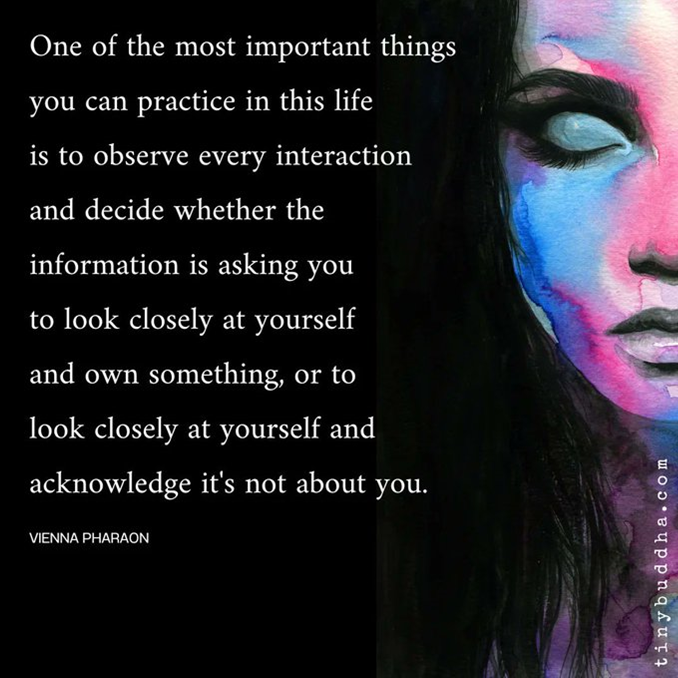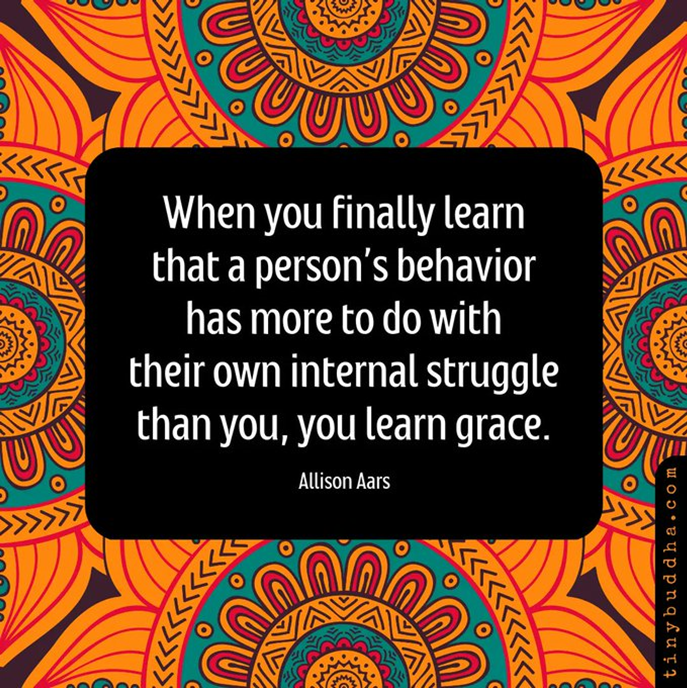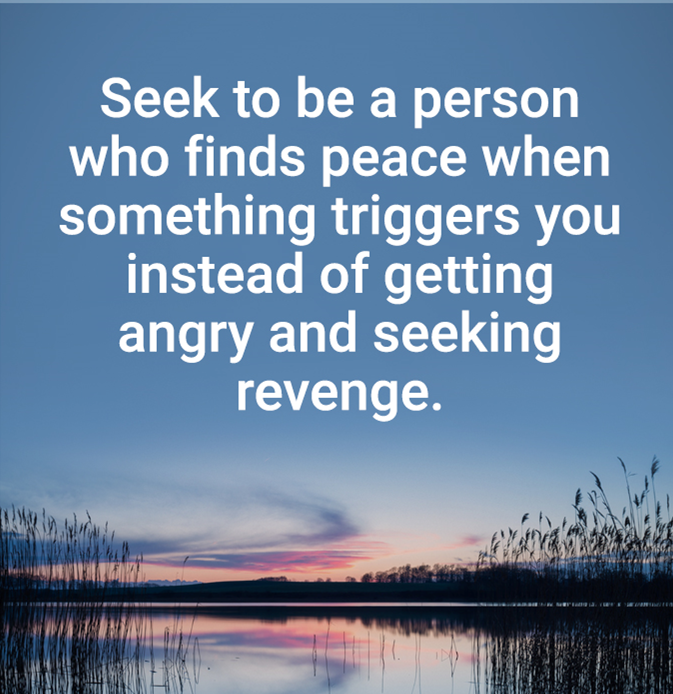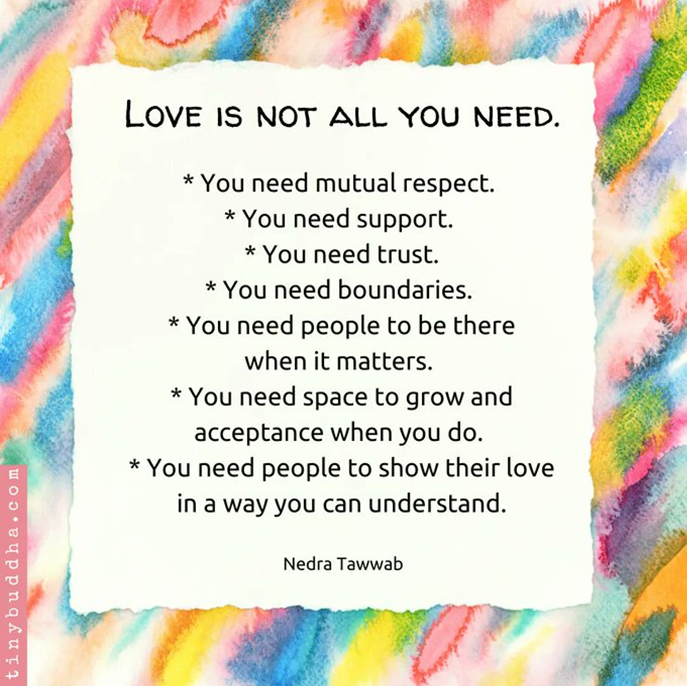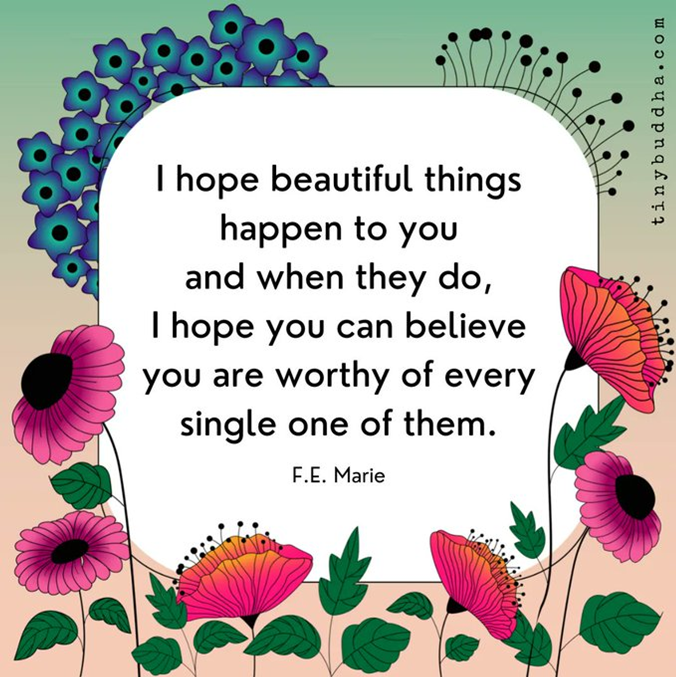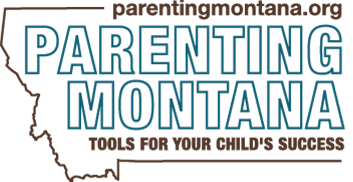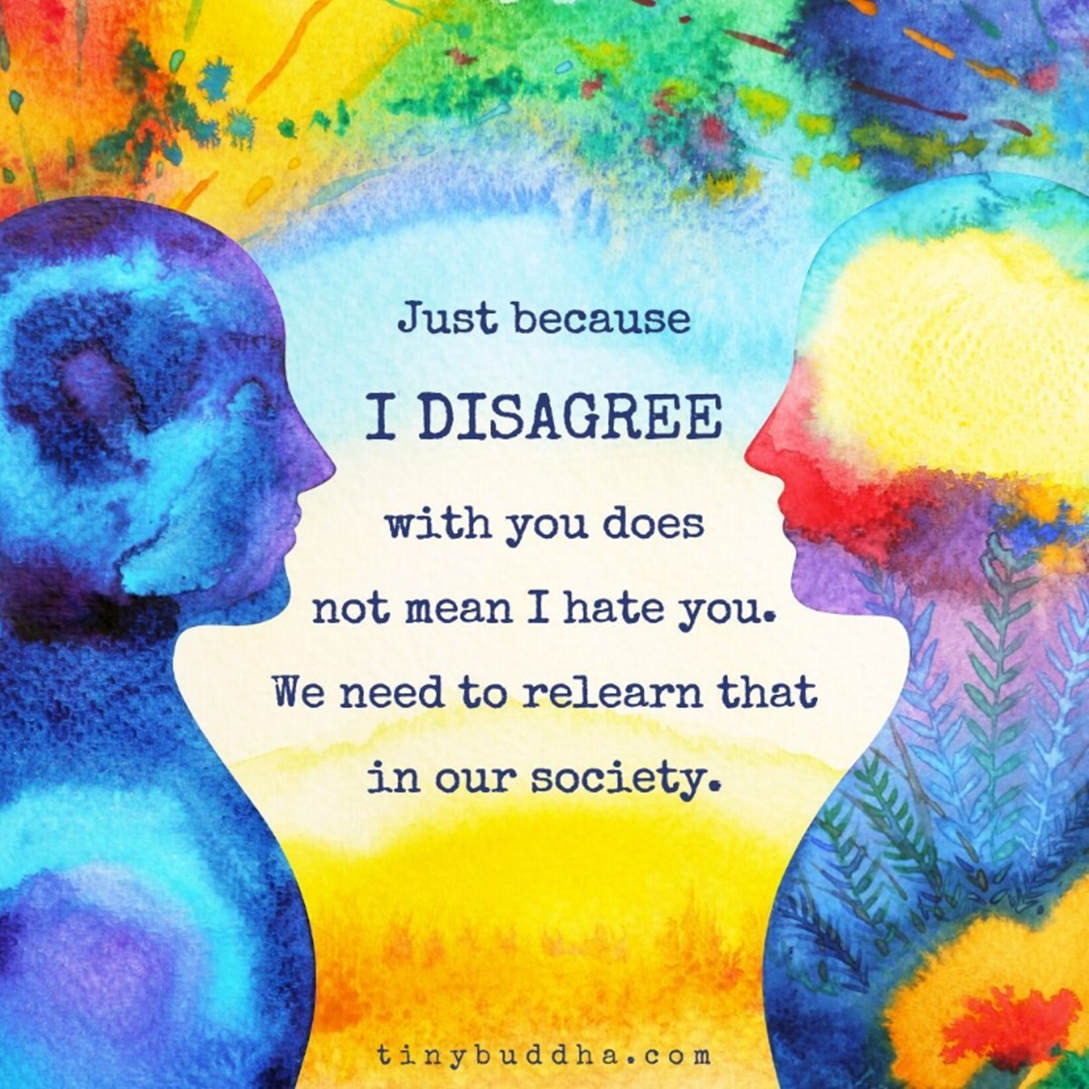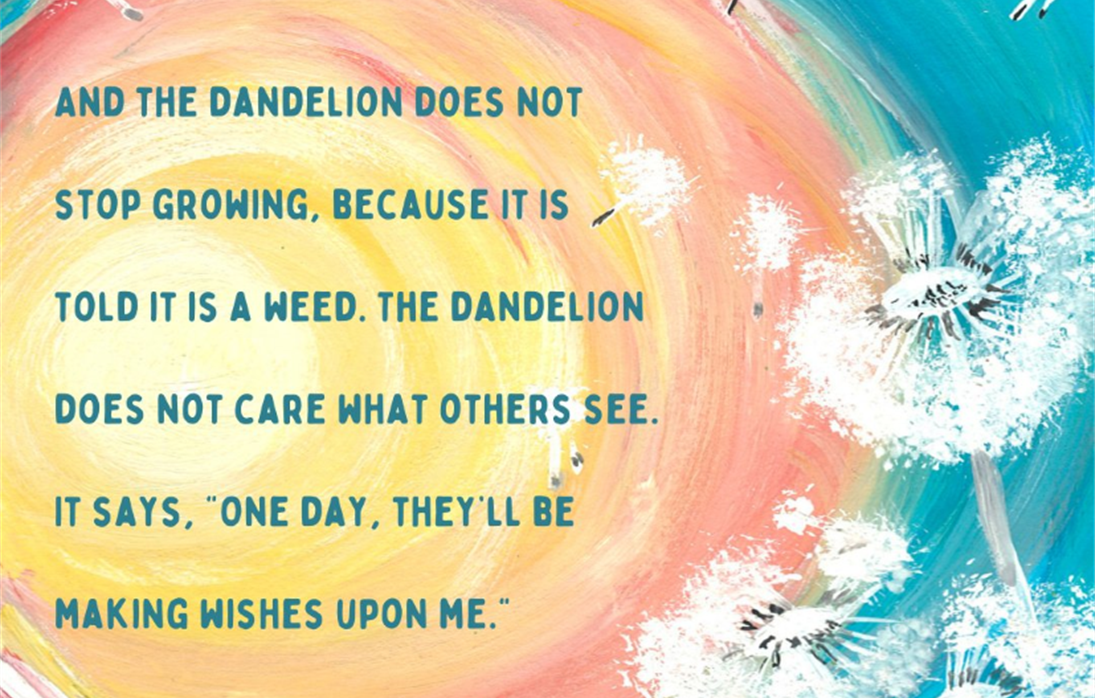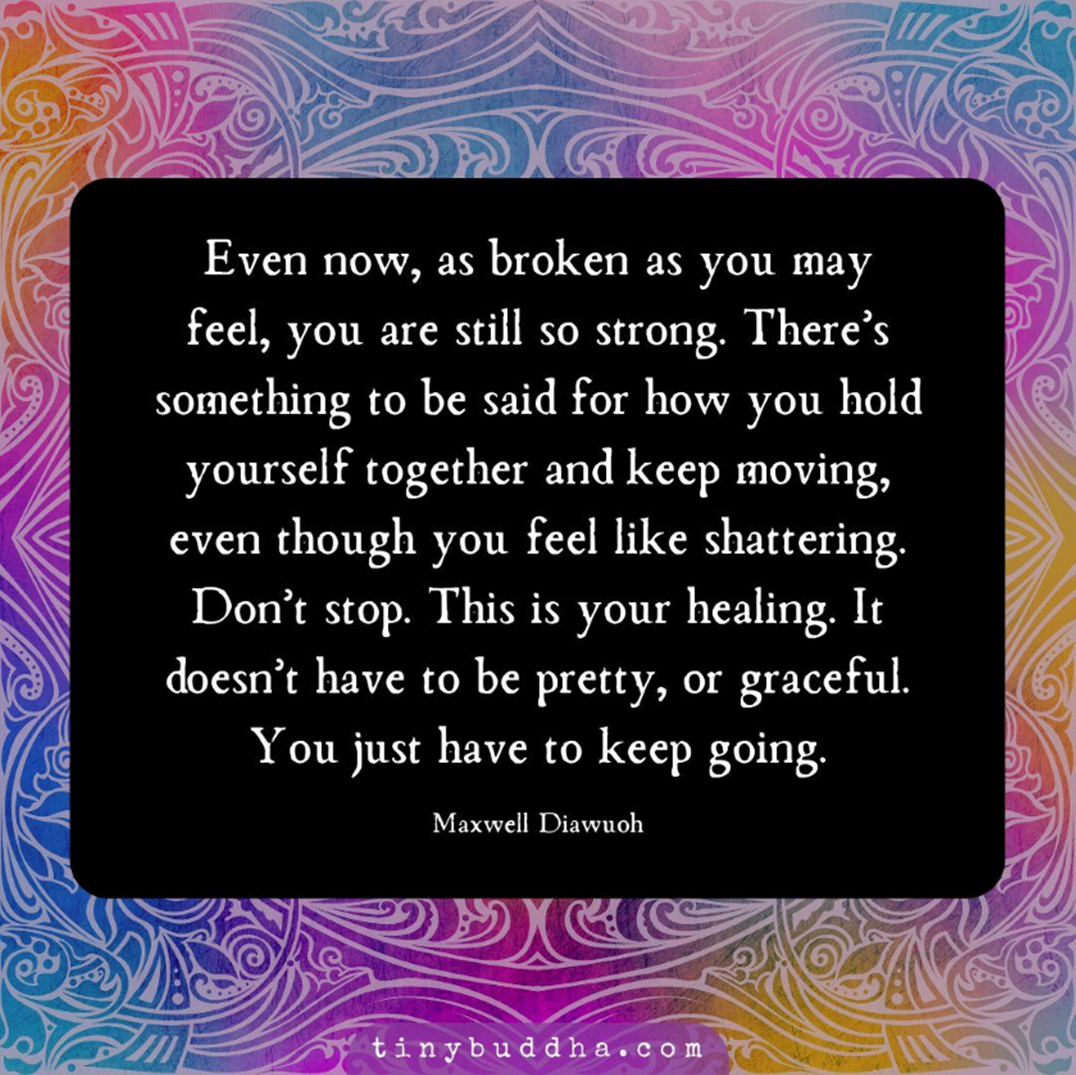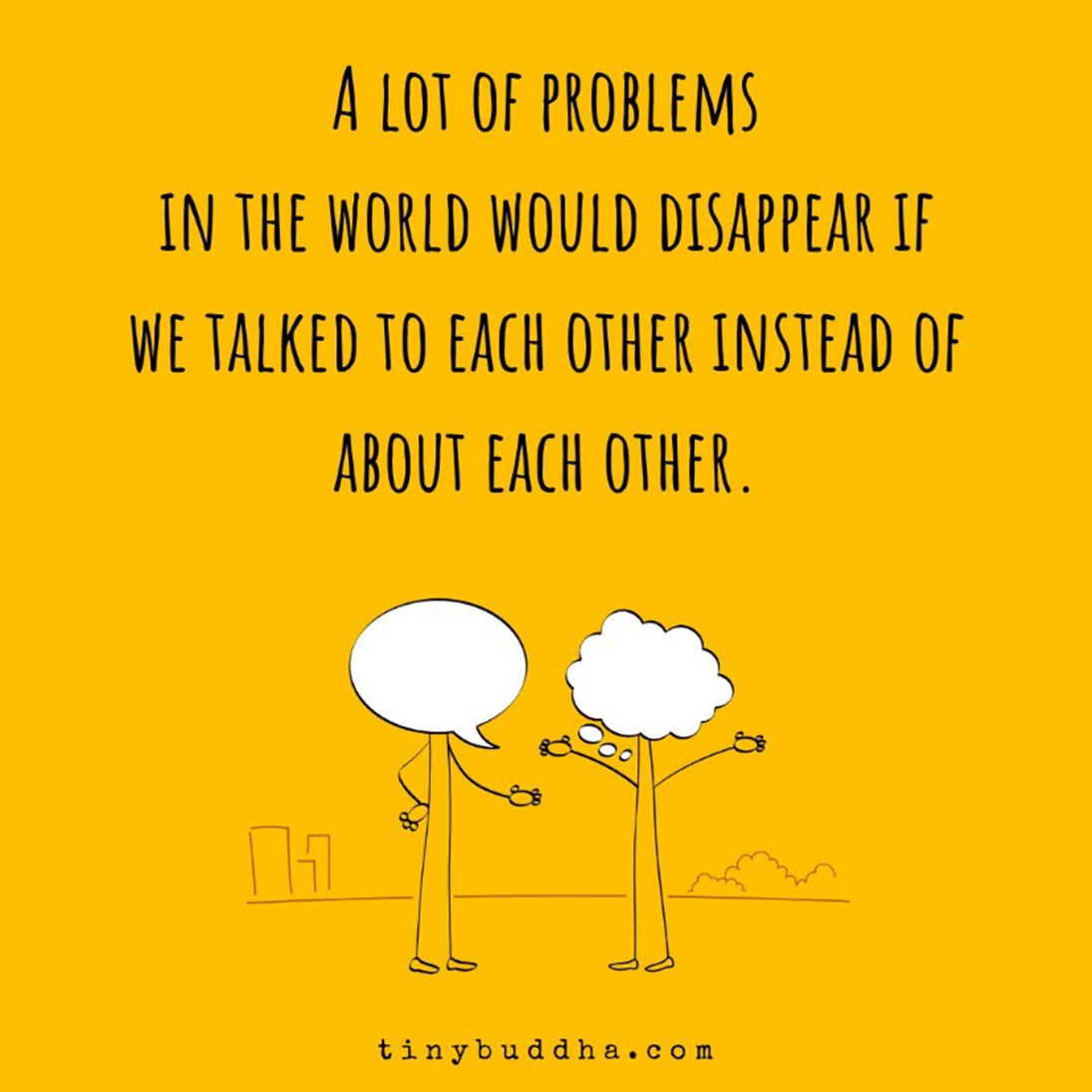Wellness Weekly
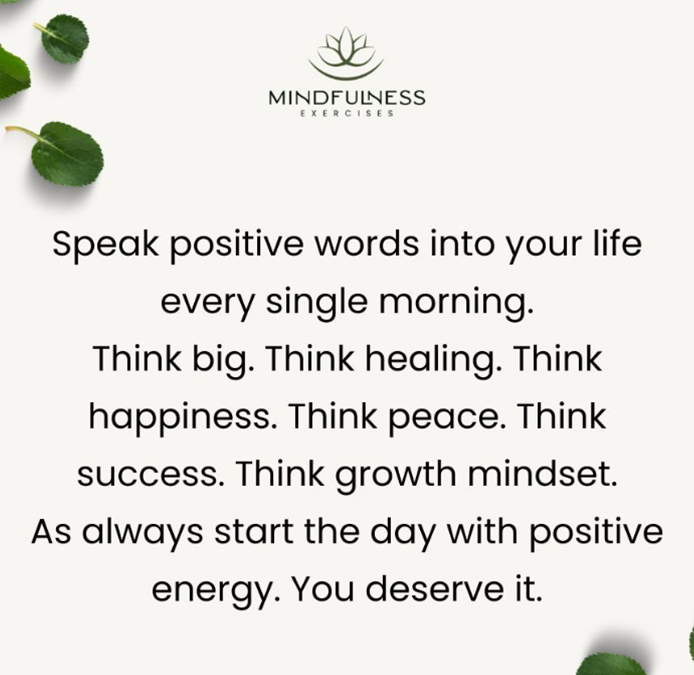
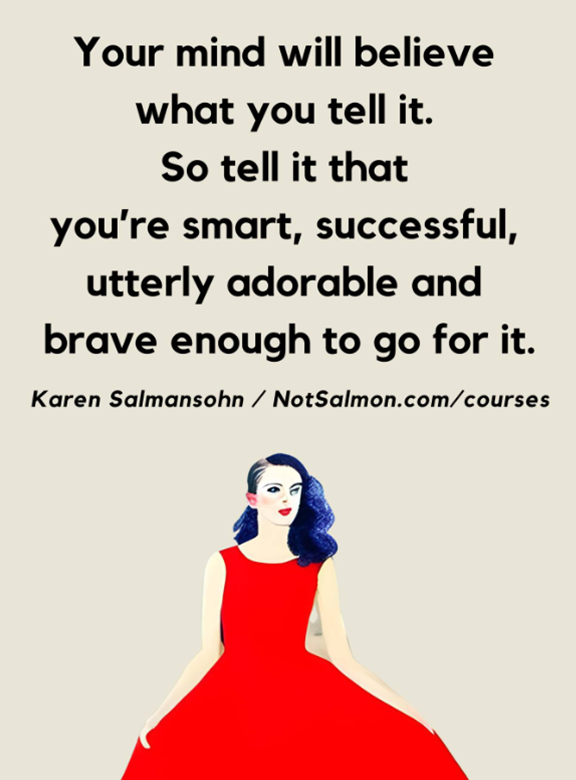
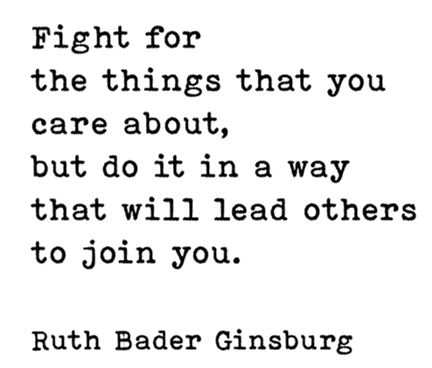
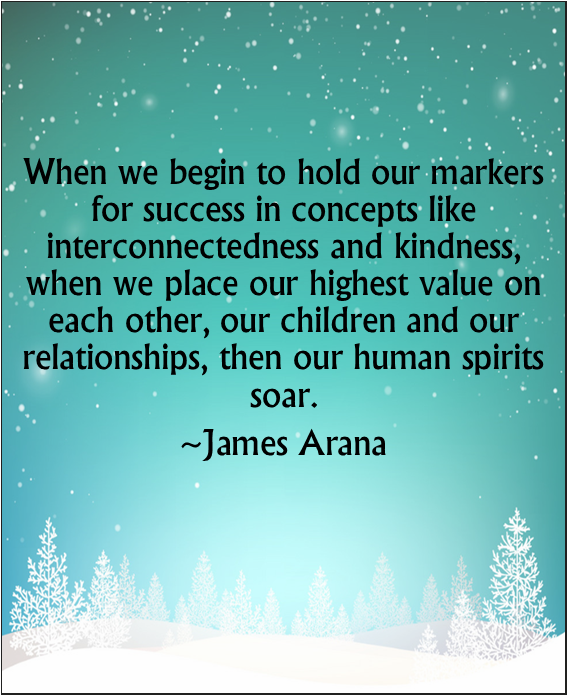
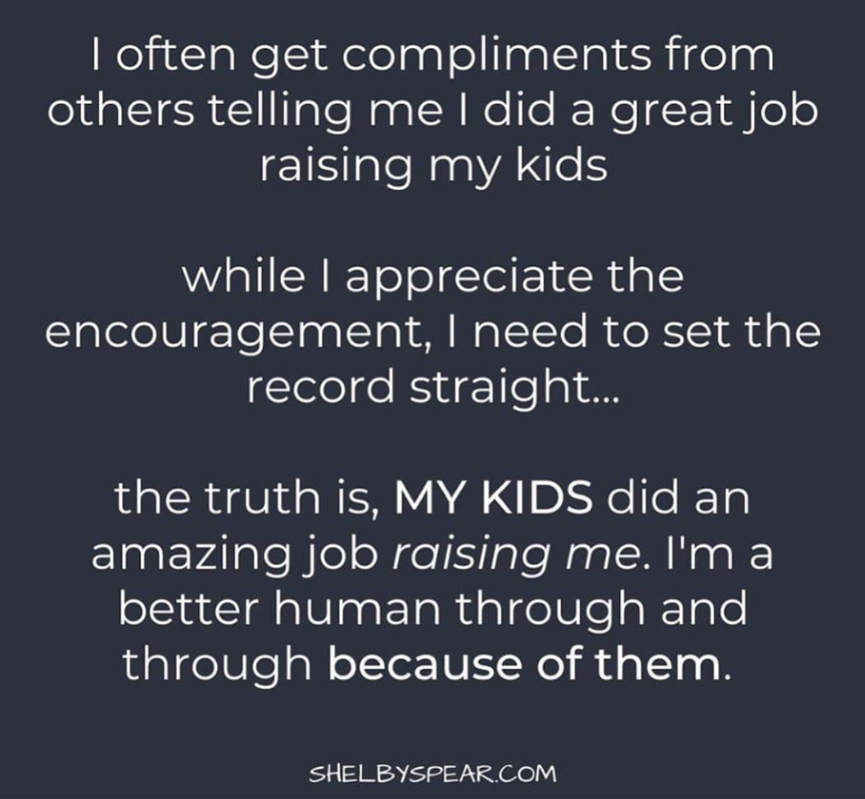
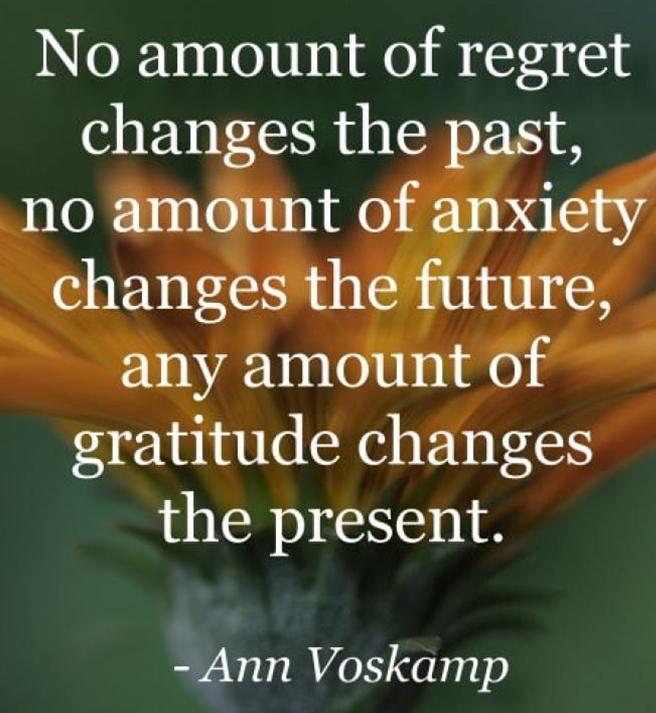
You will never reach a place in life in which you experience constant happiness or never experience challenges. What you can achieve is learning to find joy in as many moments as possible, fully embracing the good when it graces your life, and navigating the challenges life throws your way with greater ease. It all has its place; it all contains a blessing. Beauty can be found in every season of life.
~writers, @writers Threads.net, 10/28/23
Sometimes the best thing to do is to stop talking about it and let it be. Let the
emotions fade. Let the body relax.
@thepositiveminds

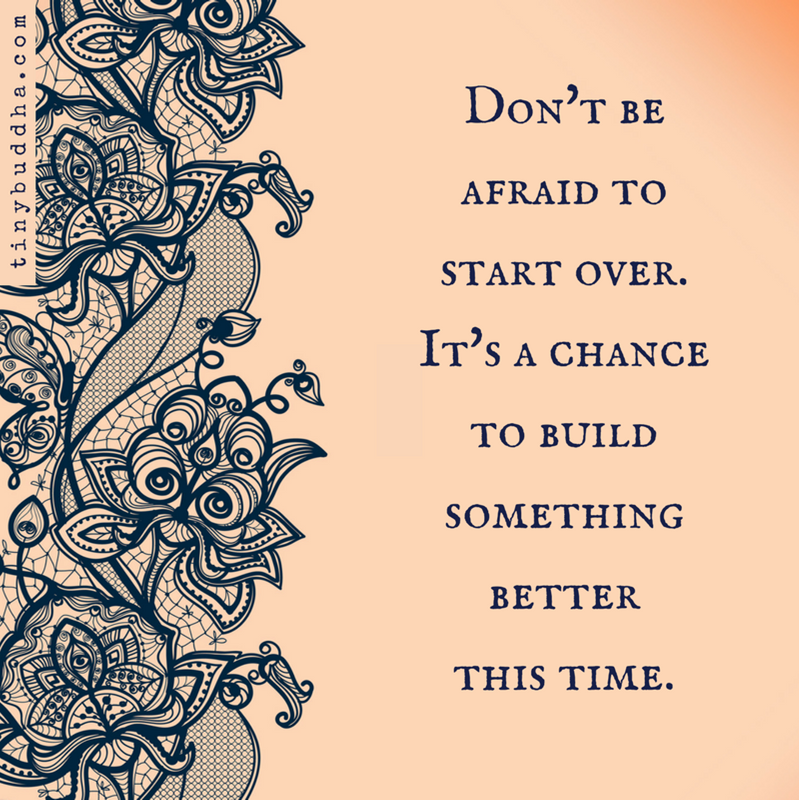
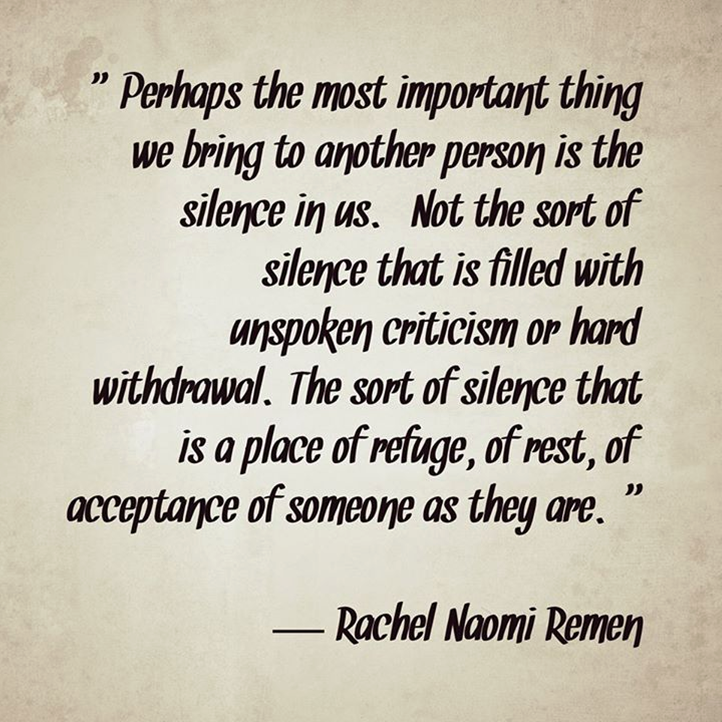
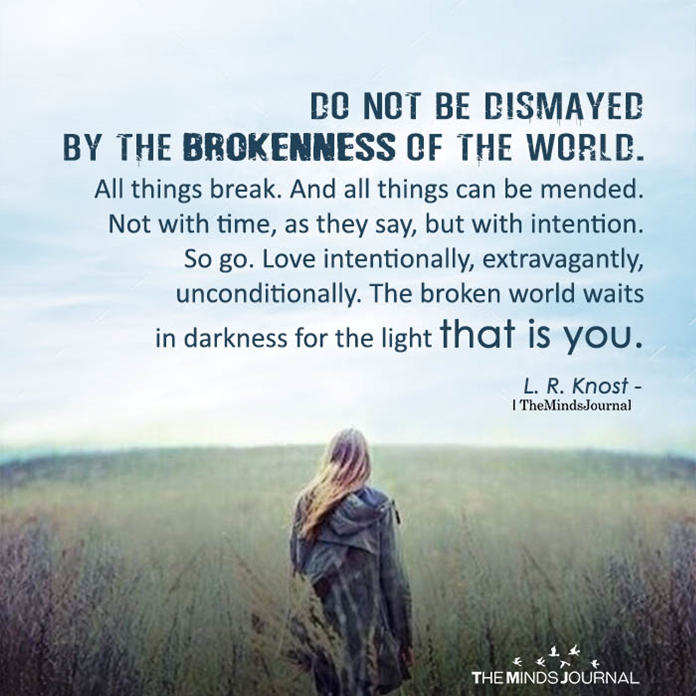
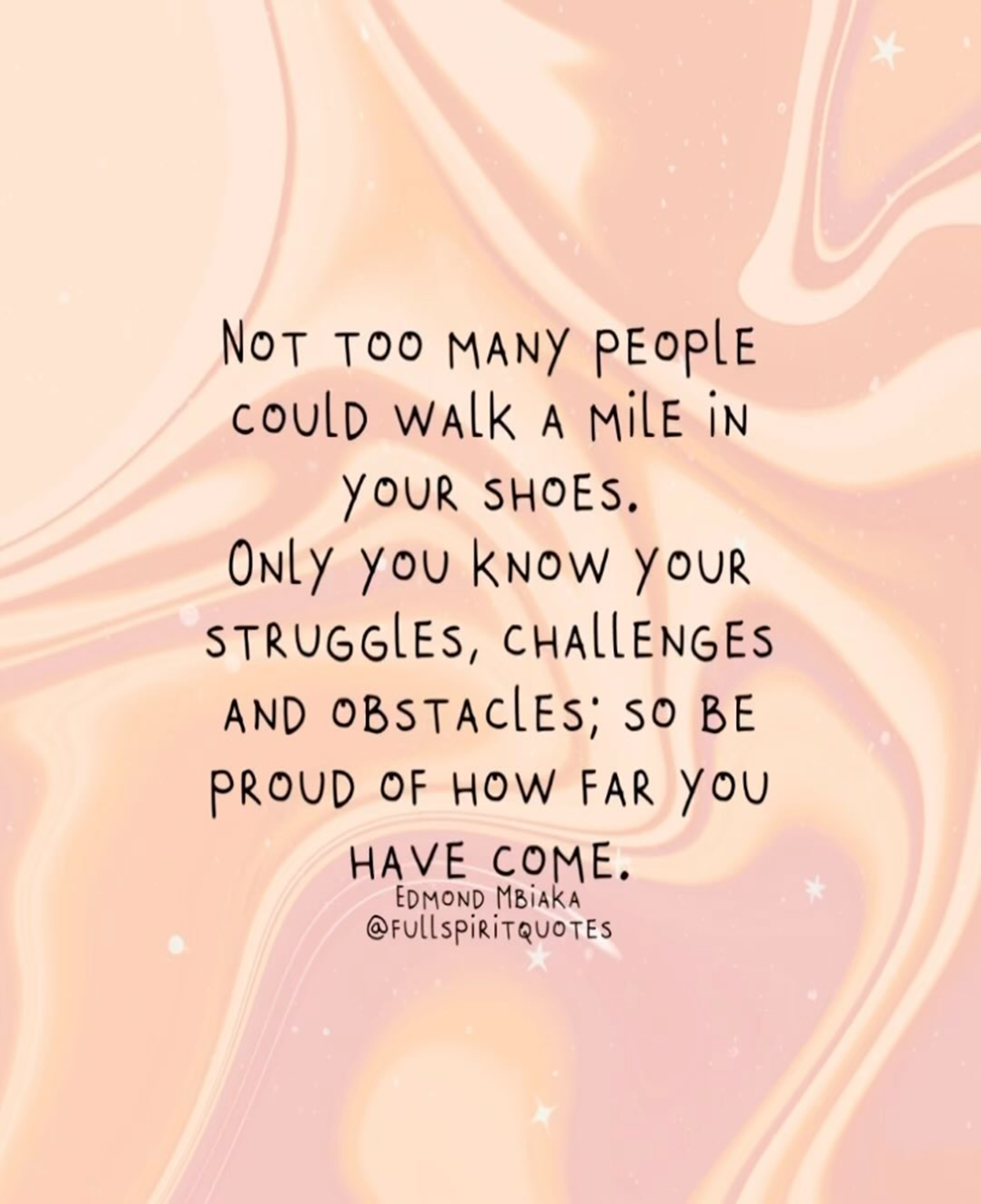
Attunement is our ability to be aware of and respond to our child’s or loved one’s needs.
It is a way to create and strengthen the emotional bond.
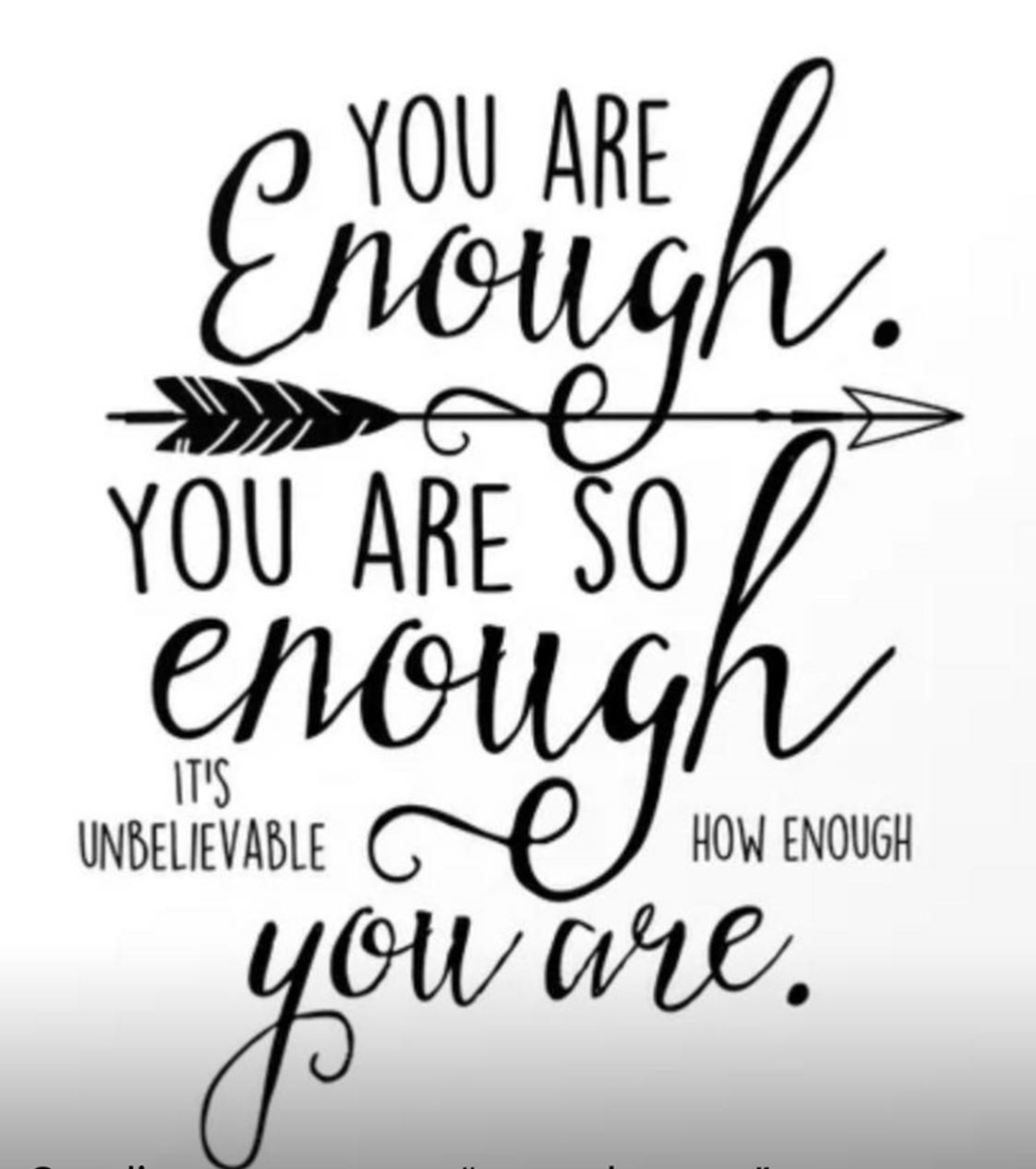
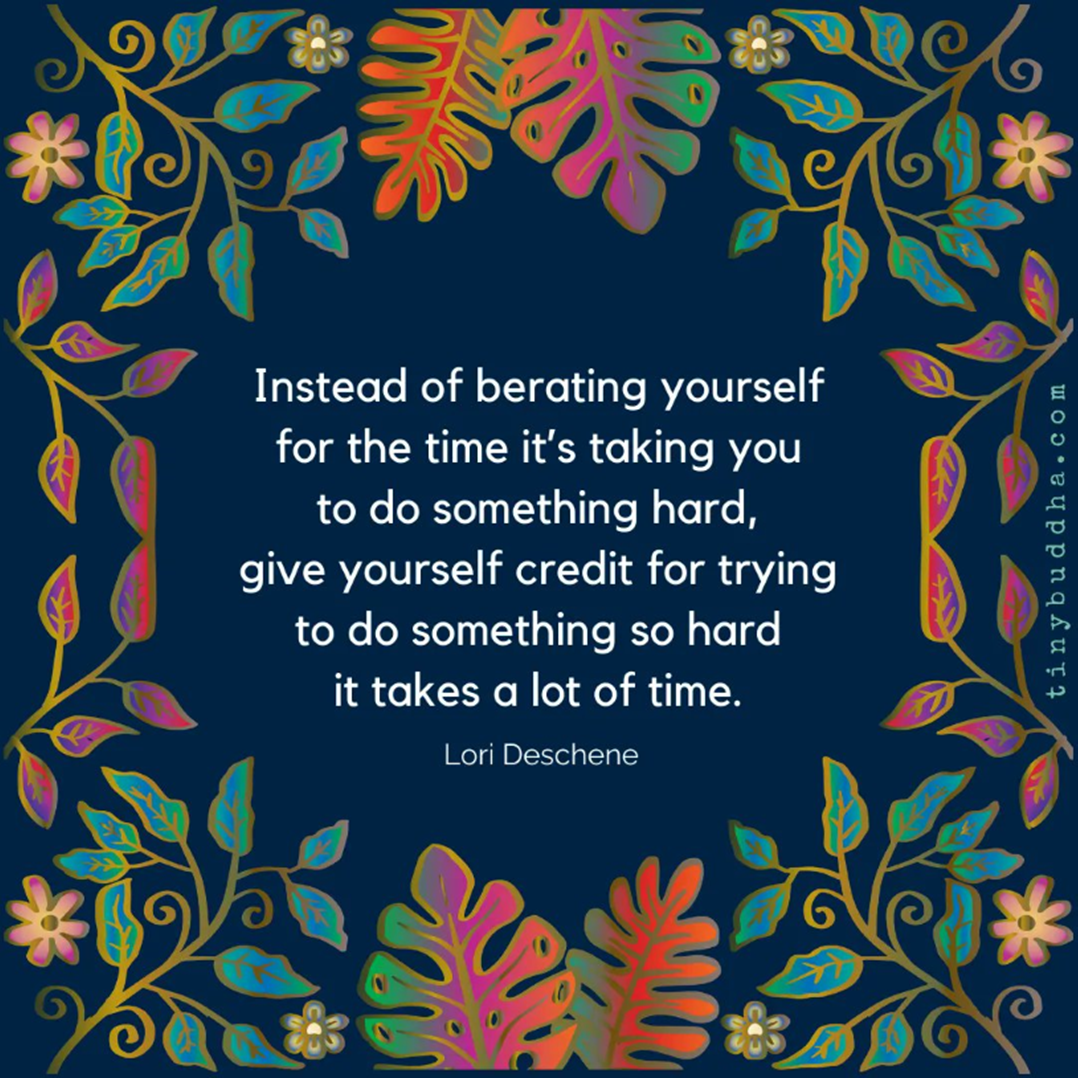
Tiny Buddha, @tinybudda, Twitter, 8/18/2023
What helps you grow personally and be in good health?
When we are balanced and well-nourished, we “go with the flow” of life’s cycles smoothly and easily. When out of balance, we experience loneliness, feelings of abandonment, poor boundaries and an inability to find pleasure and nourishment in our relationships. Here are tips for nourishing all parts of ourselves:
vPhysically: Eat whole foods, exercise, and go to bed on time.
vEmotionally: Feel all feelings. Don’t wallow in them, simply recognize that each emotion is there
for a reason and has something to teach us.
vMentally: Practice mindful eating or breathing. Each week, give yourself a social media break
and limit the amount of news you take in daily.
vSpiritually: Pray, meditate, read spiritual books and spend time in nature. Allow yourself to
put something fun on your to-do list.
https://extension.illinois.edu/blogs/refill-your-cup-self-care/2021-03-24-nourishing-yourself
Seeing Beyond Duality
Do you find yourself caught up in “either/or” thinking or thinking everything in life is either a success or failure, that your way of doing things is always the right way, or that there is always a winner and a loser? This approach of seeing life as a play of opposites is termed dualistic thinking.
We need to use wisdom and clarity to move beyond dualities. With practice, we can come to see life’s ups and downs as a process of learning that leads to a vision of openness, wholeness and unity. A nondualistic approach is “yes, and” versus “yes, but.”
Viewing life through a nondualistic lens allows us to be less judgmental and defensive. We may see our partner’s side of things in an argument, connect with others in new ways, or experience less conflict in our relationships.
https://extension.illinois.edu/blogs/refill-your-cup-self-care/2021-04-22-seeing-beyond-duality
Self-compassion
Treating yourself with kindness. When we fail, make errors, feel inadequate, or are faced with life’s difficulties, we should strive to encourage ourselves.
Remember to:
Treat yourself as you would treat a friend
Use supportive touch.. breathe deeply and
give yourself a hug
Surround yourself with encouraging people
Replace your inner critic with positive
affirmations
Distance yourself from social media
~Kristen Neff
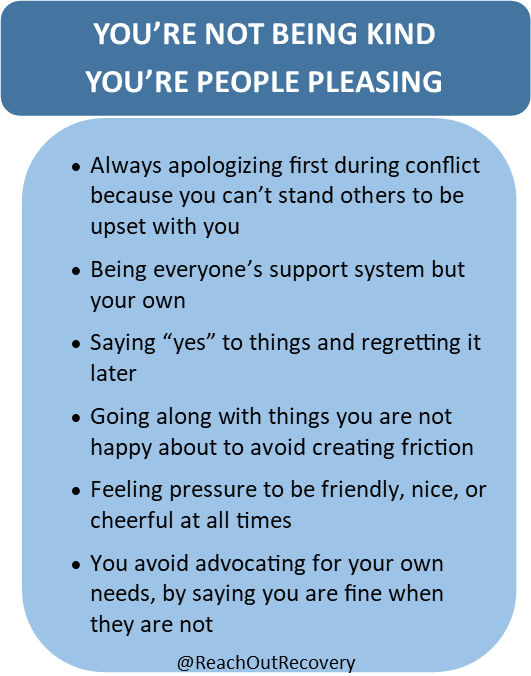
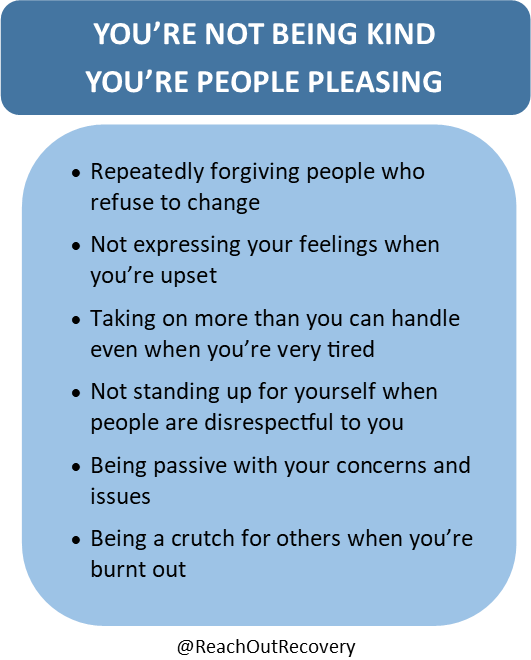
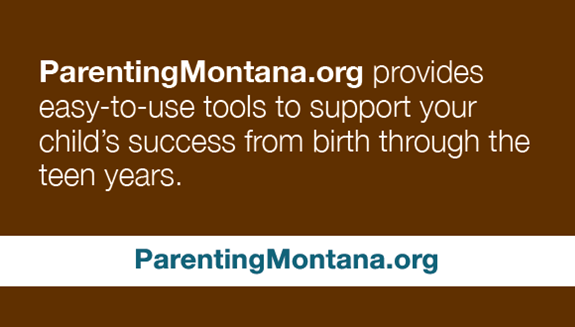
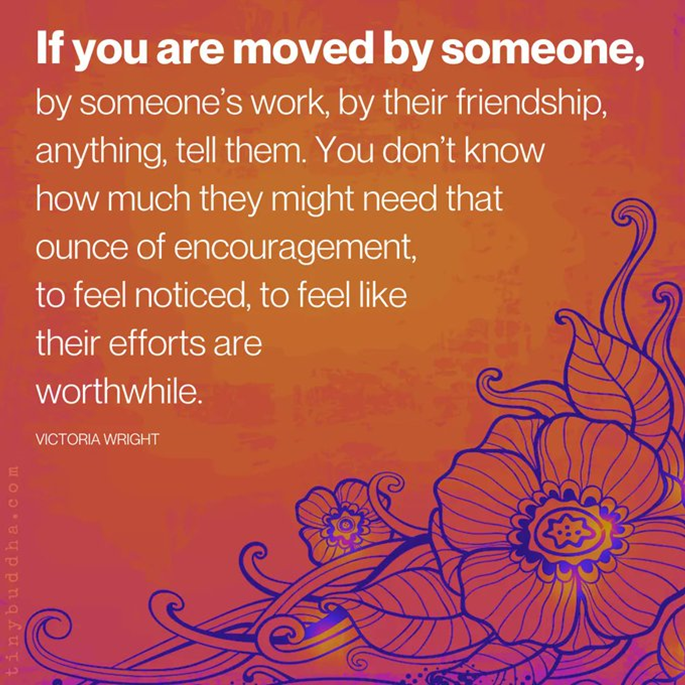
Tiny Buddha, @tinybuddha, Twitter, 6/28/2023
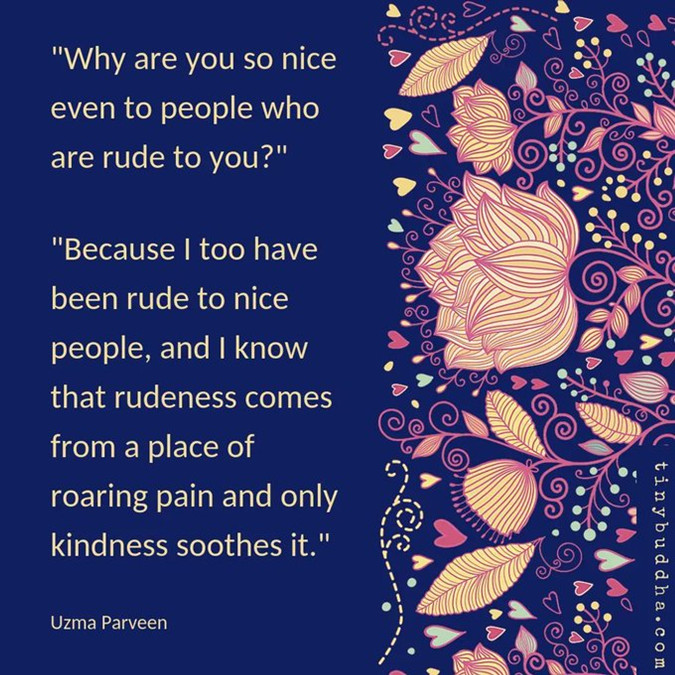
Tiny Buddha, @tinybuddha, Twitter, 6/16/2023
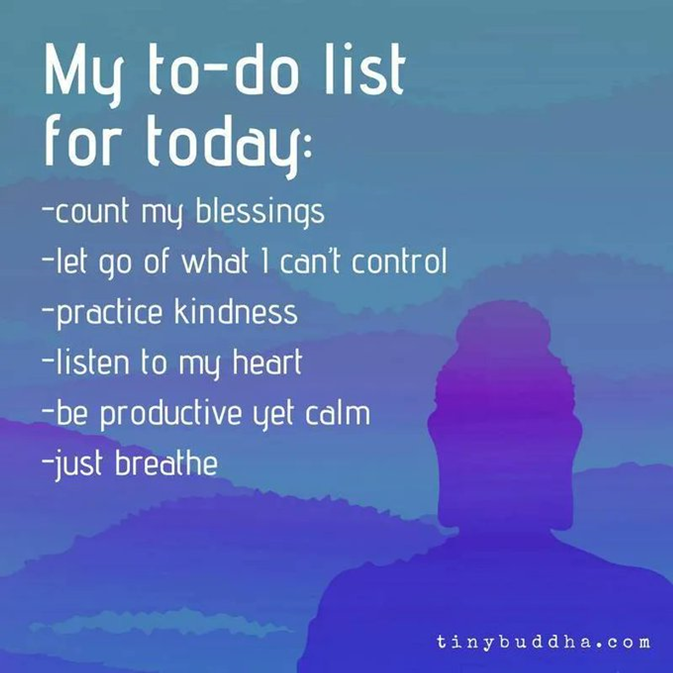
Tiny Buddha, @tinybuddha, Twitter, 6/19/2023
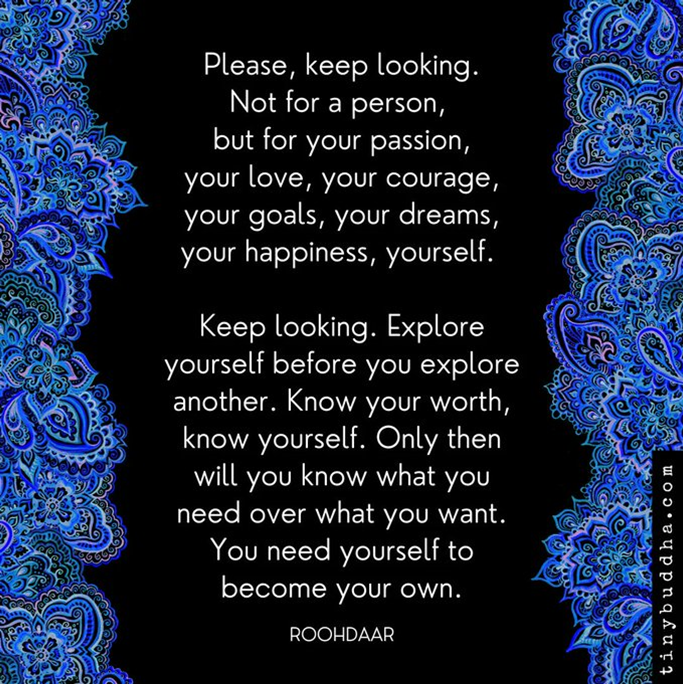
Tiny Buddha, @tinybuddha, Twitter, 6/2/2023

Tiny Buddha, @tinybuddha, Twitter, 6/2/2023
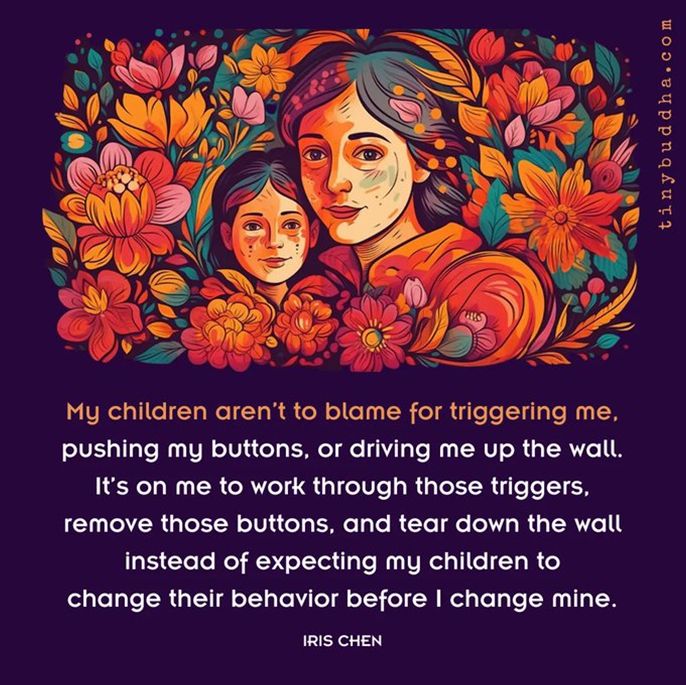
Tiny Buddha, @tinybuddha, Twitter, 5/15/2023
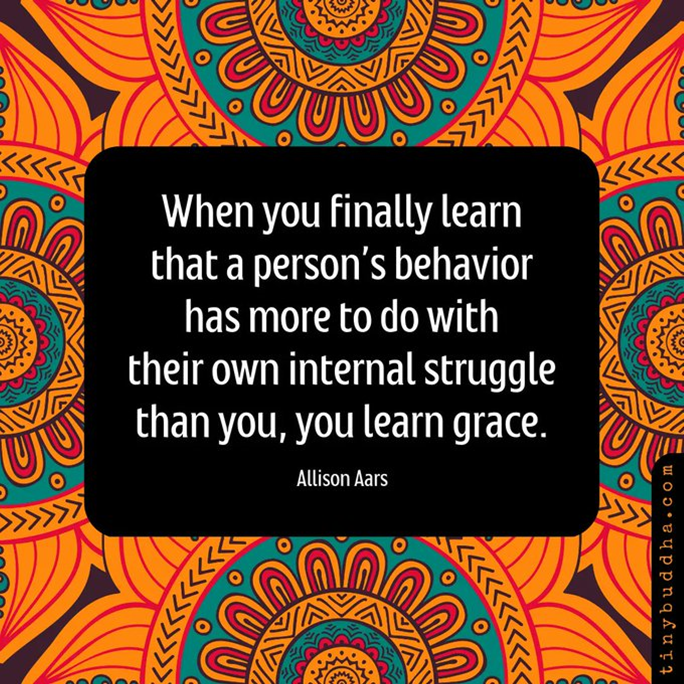
Tiny Buddha, @tinybuddha, Twitter, 5/16/2023
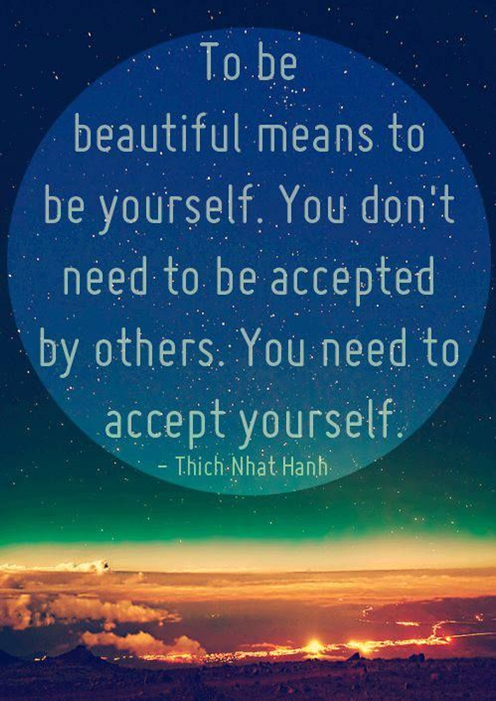
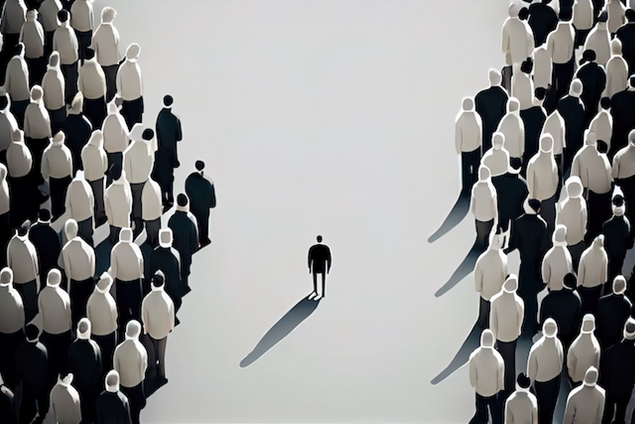
"We all deserve to belong, regardless of how we’ve struggled. Don’t let your struggles define you. Instead, validate the fact that they have given you the strength to get where you are now."
Tiny Buddha, @tinybuddha, Twitter, 5/2/2023
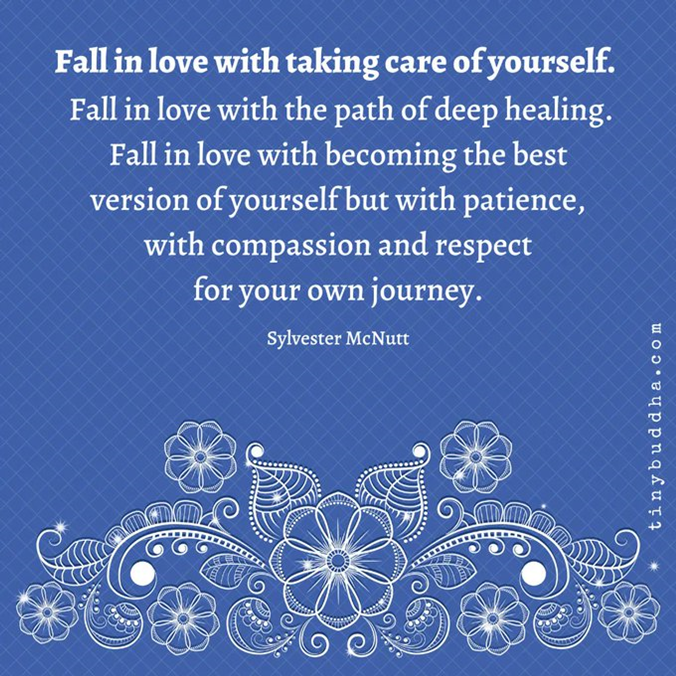
Tiny Buddha, @tinybuddha, Twitter, 4/26/2023
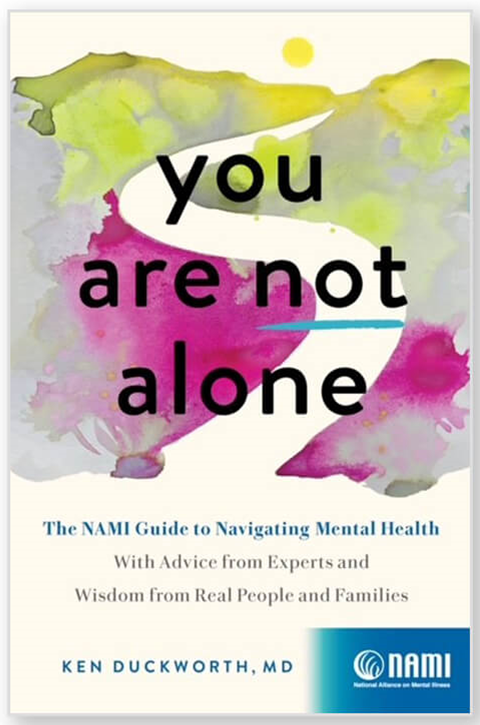
A powerful reminder that help is here. You are never alone.
Copies of book at Extension Office or the Library.
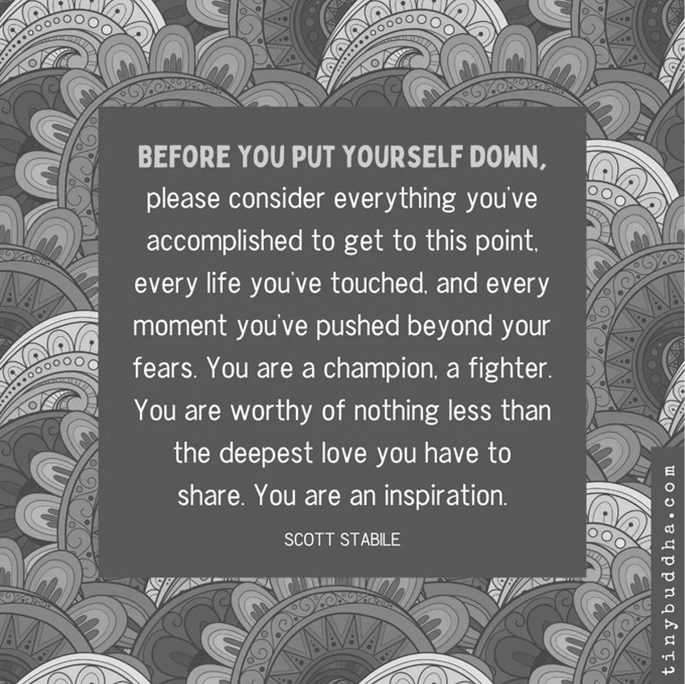
Tiny Buddha, @tinybuddha, Twitter, 4/7/23
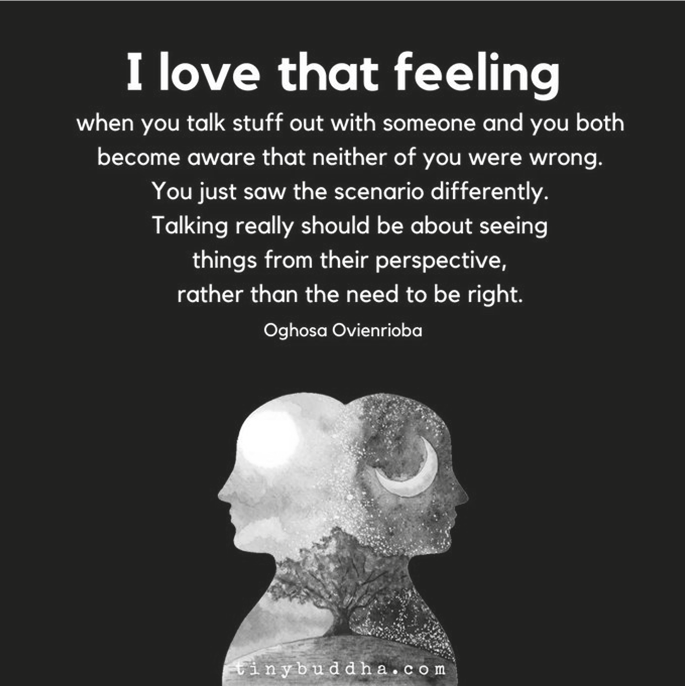
Tiny Buddha, @tinybuddha, Twitter, 4/6/23
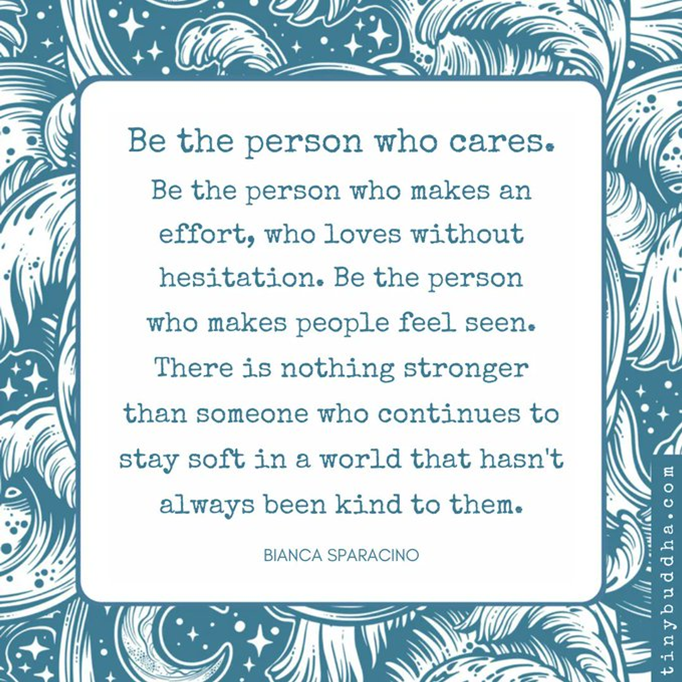
Tiny Buddha, @tinybuddha, Twitter, 3/29/23
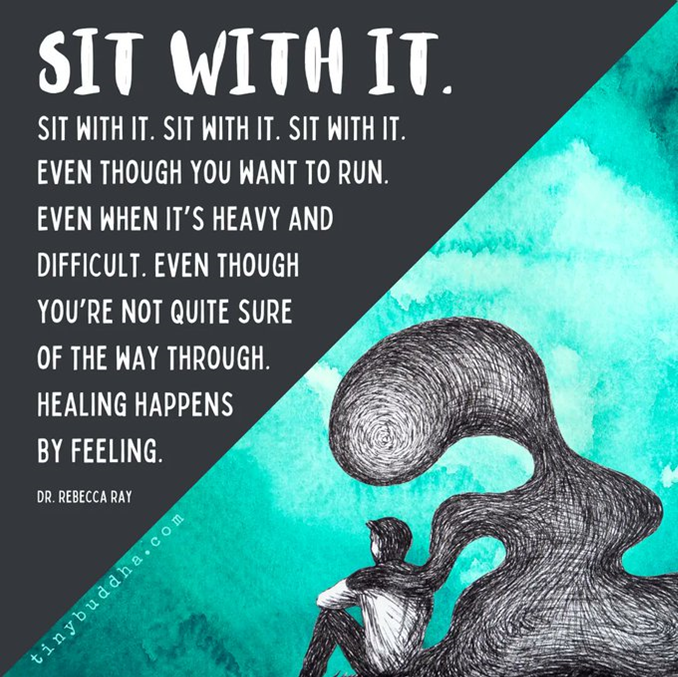
Tiny Buddha, @tinybuddha, Twitter, 3/22/23
Tiny Buddha, @tinybuddha, Twitter, 3/14/23
Tiny Buddha, @tinybuddha, Twitter, 3/8/23
The Mindfulness Meditation Institute, @TrainingMindful, Twitter, 2/27/23
Tiny Buddha, @tinybuddha, Twitter, 2/22/23
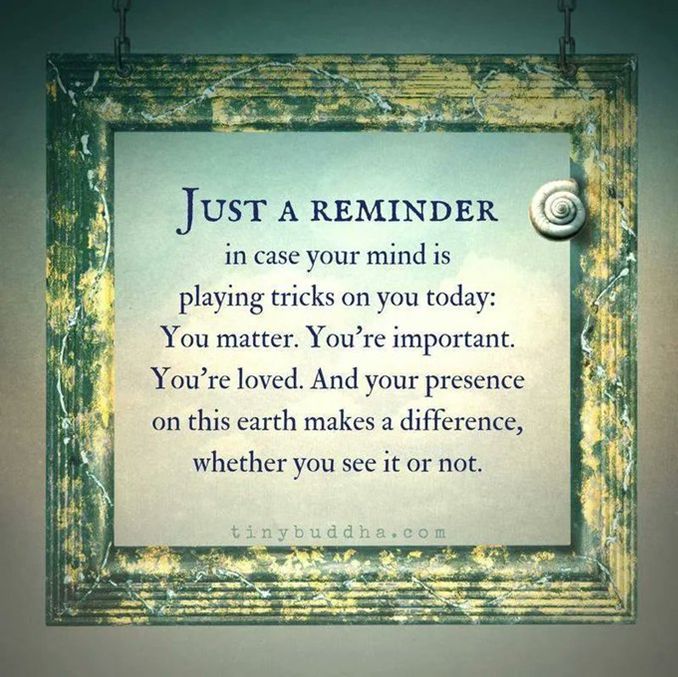
Tiny Buddha, @tinybuddha, Twitter, 2/10/23
Tiny Buddha, @tinybuddha, Twitter, 2/10/23
Accept Multiple Realities
Find the Magic in “AND”
Multiple realities means that two things can be true at once, which helps us be less attached to our own ways of thinking, and more open to growth and understanding.
The word “AND” helps us expand into a new way of thinking.
Practice “AND” regularly. For example:
¨ My perspective about this is valid *and* so is theirs even though we disagree.
¨ What they did was wrong *and* I learned from the experience.
¨ I can know someone’s toxic for me *and* miss them.
¨ I feel grateful *and* sad at once.
Dr. Nicole LePera@Theholisticpsyc 2/4/23
Quit Your Way

- A FREE personalized quit plan
- 5 FREE pro-active cessation coaching
sessions - FREE nicotine replacement therapy
(patch, gum, lozenge) for callers 18 and
older engaged in the program - Online CHAT option
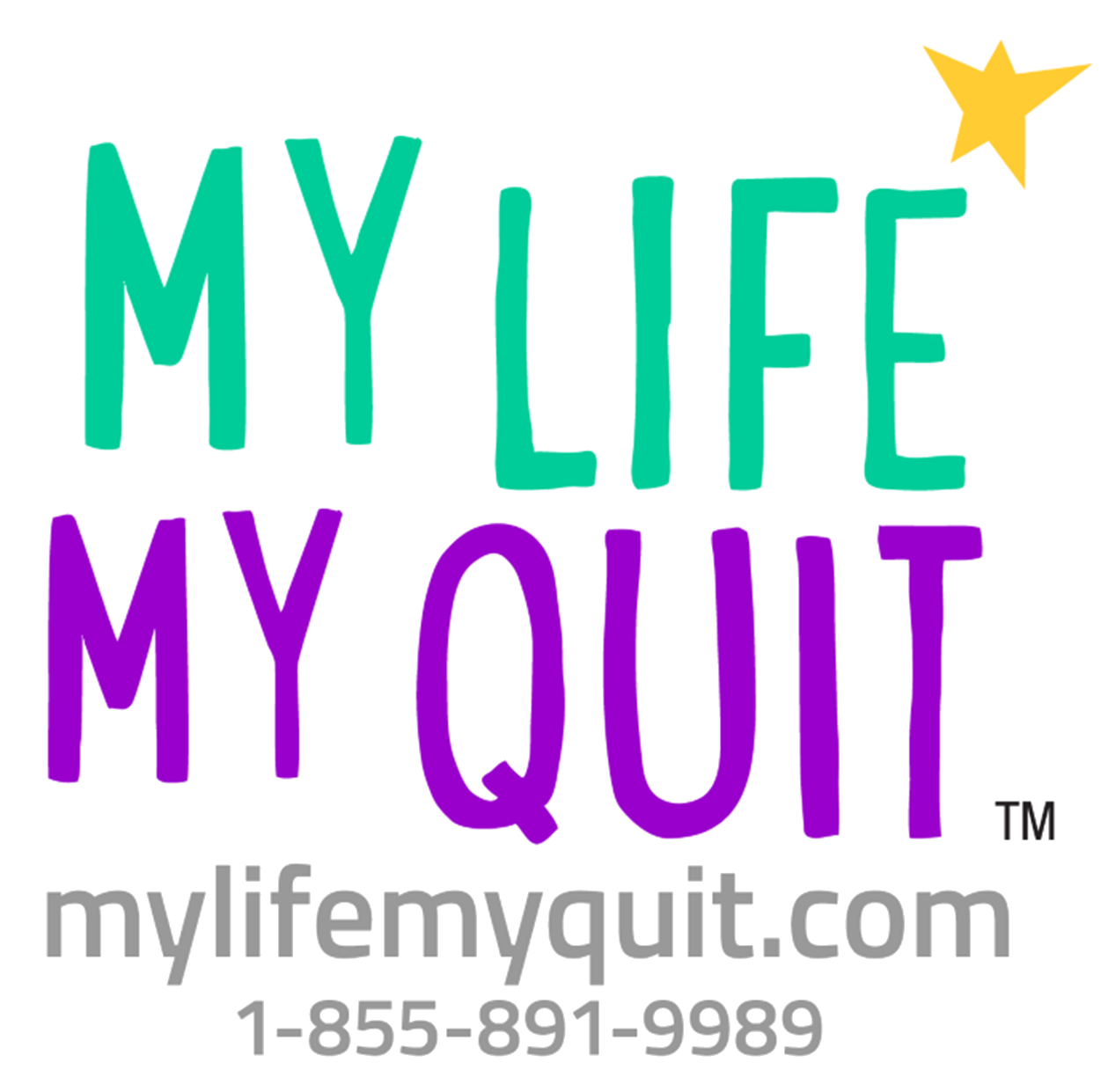
- Dedicated toll free number 1-855-891-9989 or text "START" to 36072
- For youth under 18
- FREE coaching sessions by live text, online chat, or phone
- Coaches specially trained in working with youth
- RESPECTS privacy through confidential enrollment & coaching
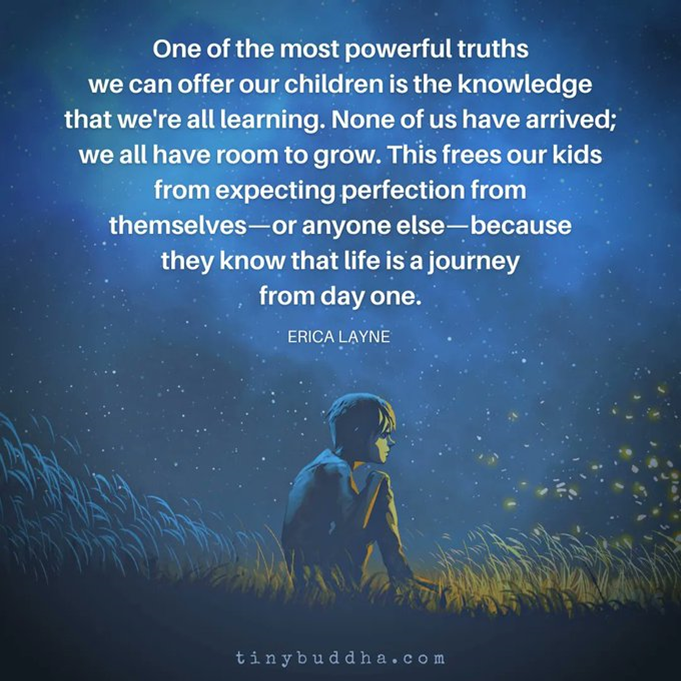
Tiny Buddha, @tinybuddha, Twitter, 1/11/23
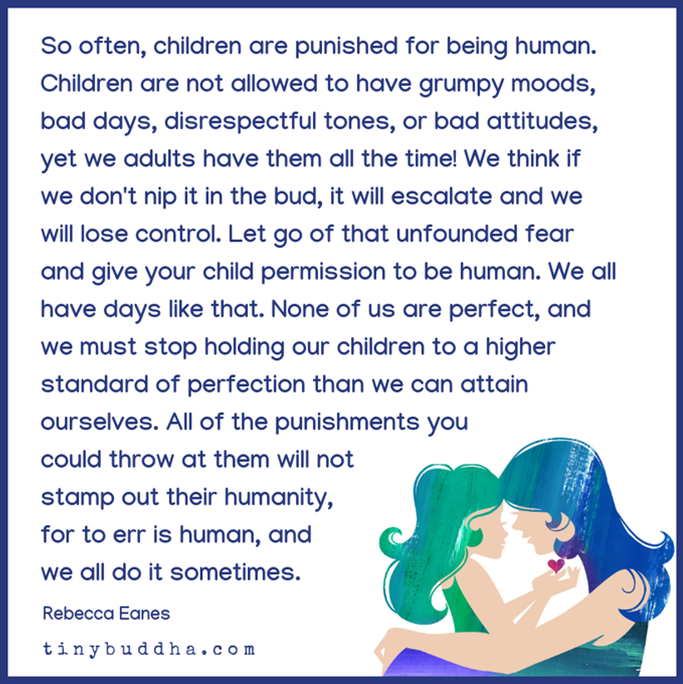
Tiny Buddha, @tinybuddha, Twitter, 1/8/23
Reduce Stress: BREATHE
Rapid, shallow breathing is a common response to stress. Slow, deep, regular breathing is a sign of relaxation, is easy to learn, can be done any time and any place. Practiced in advance, it can be used when needed most.
Repeat 4 to 6 times a day:
*Breathe in slowly and deeply, pushing your
stomach out so your diaphragm is put to
maximal use.
*Hold your breath briefly.
*Exhale slowly, thinking "relax."
*Repeat the entire sequence 5 to 10 times,
breathing deeply and slowly.
https://www.health.harvard.edu/staying-healthy/exercising-to-relax
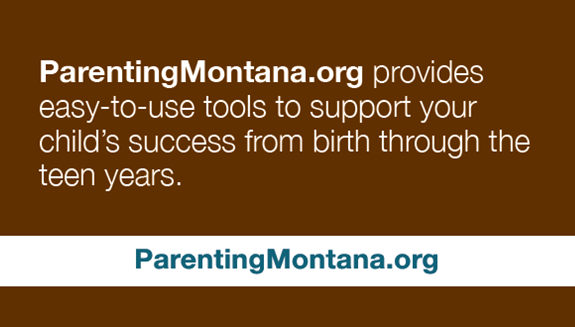
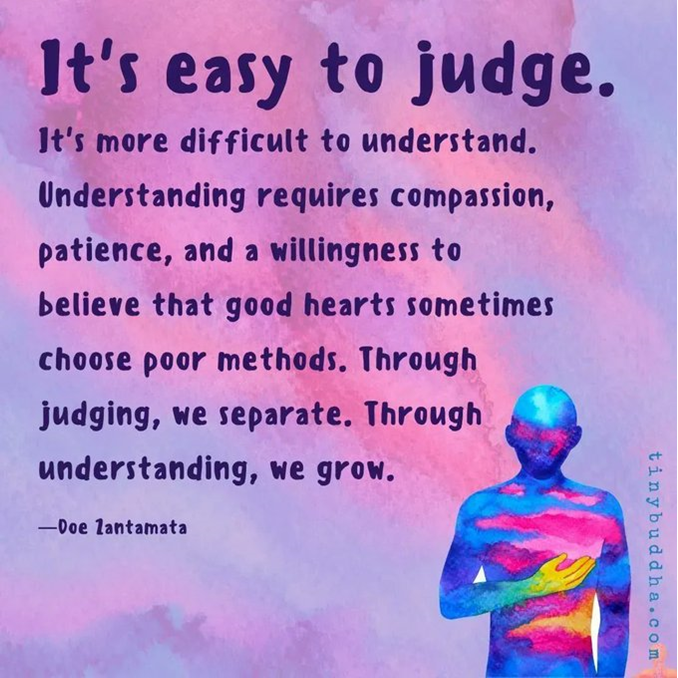
Tiny Buddha, @tinybuddha, Twitter, 12/8/22
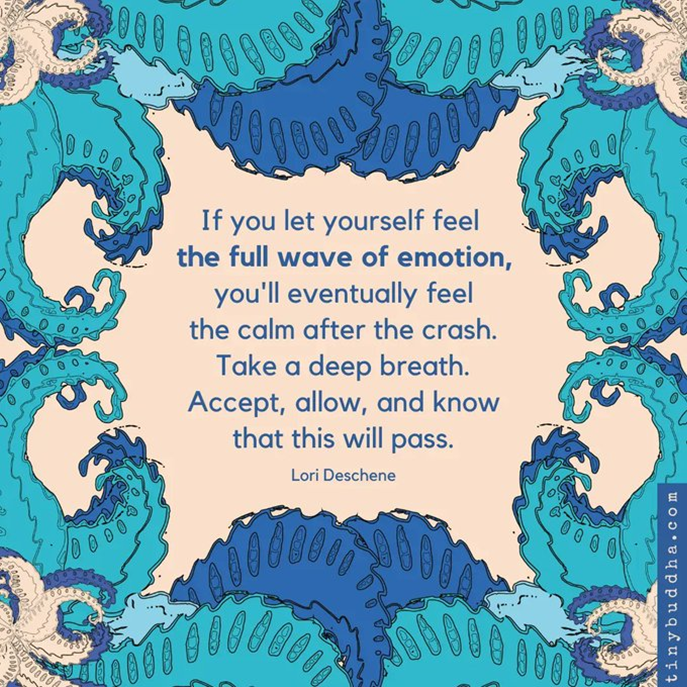
Tiny Buddha, @tinybuddha, Twitter, 12/1/22
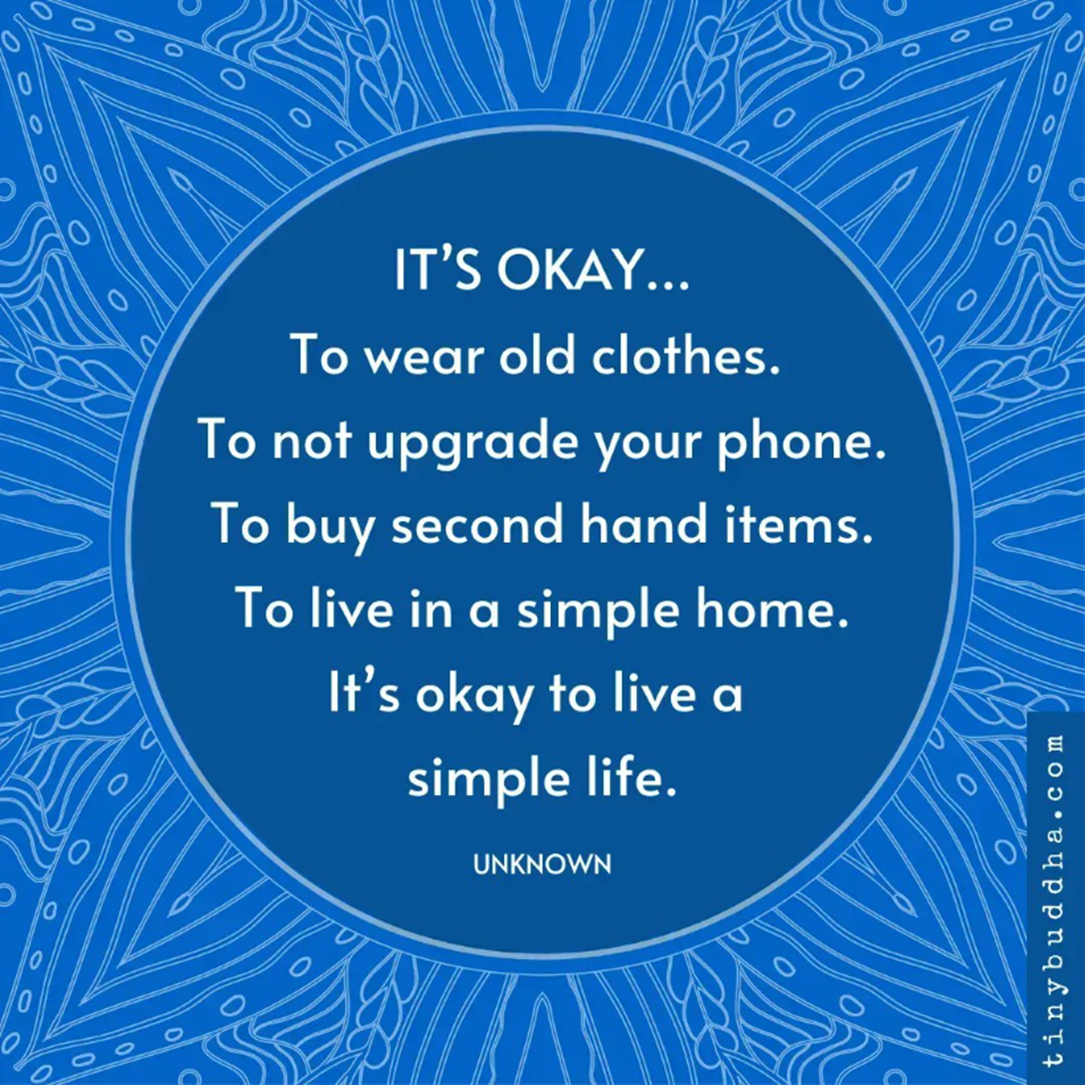
Tiny Buddha, @tinybuddha, Twitter, 11/21/22
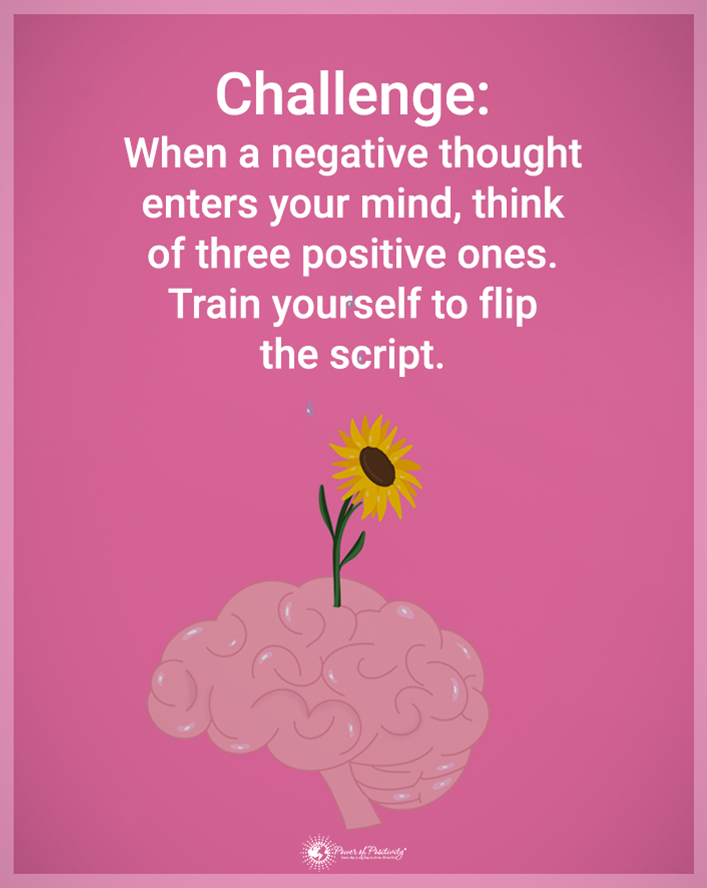
The Mindfulness Meditation Institute, @TrainingMindful, Twitter, 11/16/2022
Best Mental Health Advice
If it bothers you after 24 hours, speak up within 48 hours.
Treat YOURSELF like someone you are responsible for taking care of.
A bad day doesn’t mean a bad life.
The critical judge in your head does not tell the truth, and it does not have your best interest.
Your brain can’t be grateful and anxious at the same time. When anxiety takes hold, look for gratitude.
Stop apologizing for expressing your feelings. You’re convincing yourself that you’re not worth the space you take up.
Dr. Lena Pearlman, LCSW, @drlenapearlman, Twitter, 11/14/22
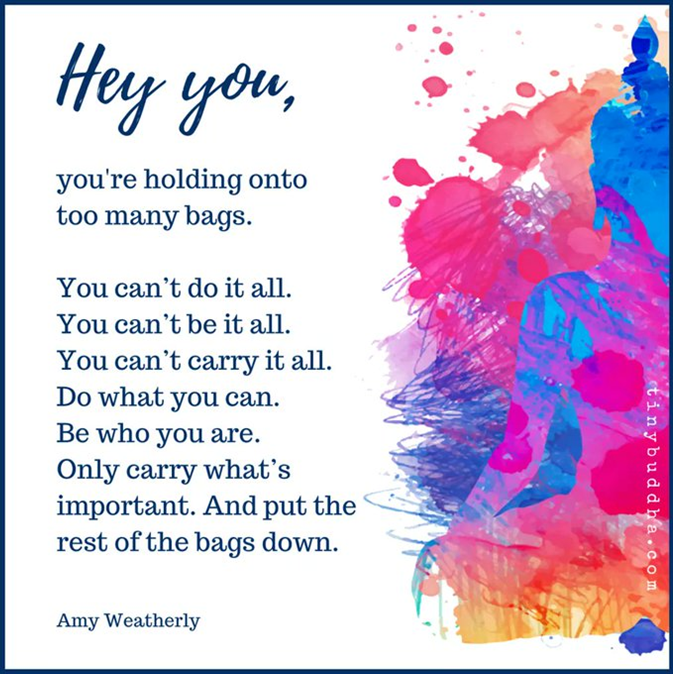
Tiny Buddha, @tinybuddha, Twitter, 10/27/22
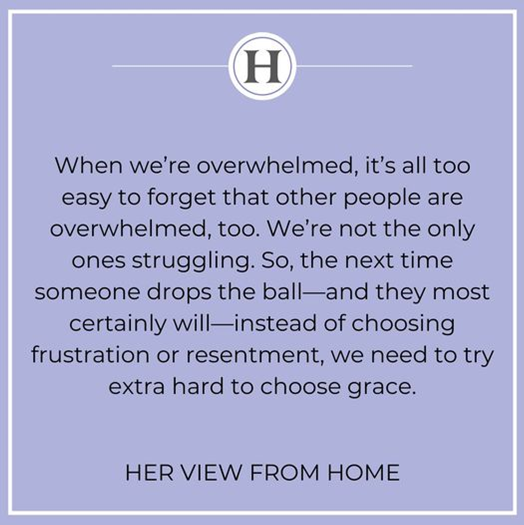
Her View From Home, Facebook, 10/26/22
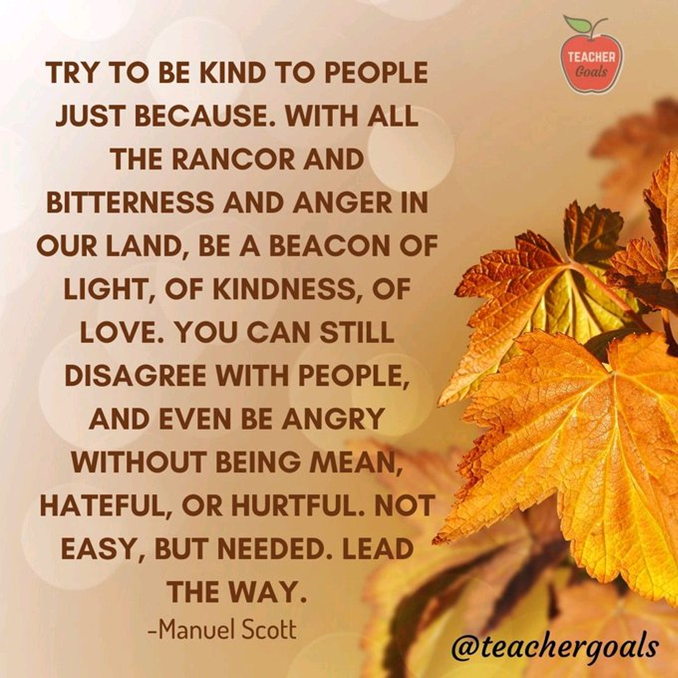
Teacher Goals, @teachergoals, Twitter, 10/23/22
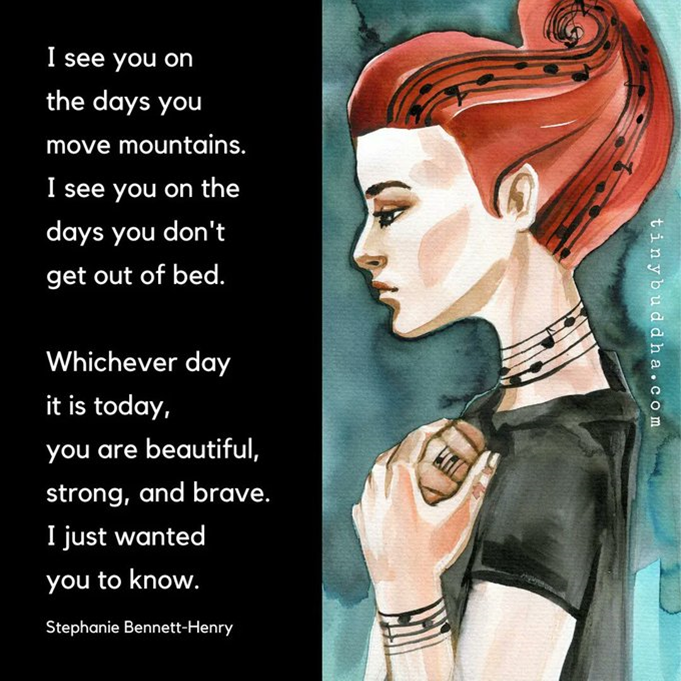
Tiny Buddha, @tinybuddha, Twitter, 10/13/22
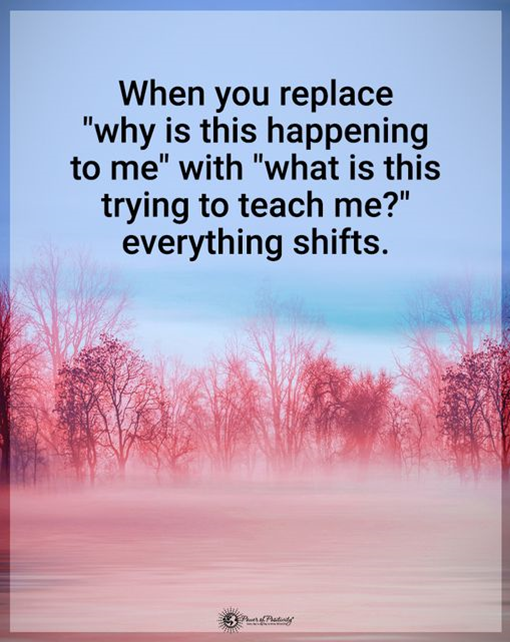
The Mindfulness Meditation Institute, @TrainingMindful, Twitter, 9/23/22

Tiny Buddha, @tinybuddha, Twitter, 9/30/2022

The Mindfulness Meditation Institute, @TrainingMindful, Twitter, 9/21/22
We often stretch our boundaries or postpone setting and enforcing them because we feel guilty or fear a negative response. Setting boundaries bolsters self-respect and self-love! Give yourself permission to focus on yourself and make your safety & comfort a priority.
#StopSuicide
Victor Armstrong, MSW, @1of2vics, Twitter, 9/19/22

The Mindfulness Meditation Institute, @TrainingMindful, Twitter, 9/12/22
“It’s easy to judge. It’s more difficult to understand. Understanding requires compassion,
patience, and a willingness to believe that good hearts sometimes choose poor methods.
Through judging, we separate. Through understanding, we grow.”
~ Doe Zantamata
The Mindfulness Meditation Institute, @TrainingMindful, Twitter, 9/5/22
"Open the door to your heart and choose love. Be kind instead of right. Remember the
good times... Take responsibility for your part. Stop the judgment. Be the bigger
person. Forgive the small things. " ~Brittany Powell
Tiny Buddha, @tinybuddha, Twitter, 8/29/22

Tiny Buddha, @tinybuddha, Twitter, 8/19/22

Tiny Buddha, @tinybuddha, Twitter, 8/11/22

Tiny Buddha, @tinybuddha, Twitter, 8/5/22

Tiny Buddha, @tinybuddha, Twitter, 7/29/22

Tiny Buddha, @tinybuddha, Twitter, 7/19/22

988 is the new national number for mental health and substance use crises. Dial or text 988 to talk to a trained crisis counselor who can give you advice and assistance in the moment you need it most.”
#988lifeline @samhsagov @CrisisAccess
Victor Armstrong, @1of2vics, Twitter, 7/16/2022
Talking publicly about suicide, and embracing the conversation as a public health issue, reduces the shame and stigma, and encourages healing. Silence on the other hand, costs lives. Instead of being afraid to talk about suicide, we should be afraid not to.
Victor Armstrong, MSW, @1of2vics, Twitter, 7/9/22

Tiny Buddha, @tinybuddha, Twitter, 7/4/22
"Agreeing to things just to keep the peace is actually a trauma response. When you do this you're disrespecting your boundaries.... You run your life. Take up space and use your voice." DJ Love Light
How to stop agreeing to things that aren’t good for you https://buff.ly/2I45G8Q
Tiny Buddha, @tinybuddha, Twitter, 6/27/22
Men are taught from an early age, not to show emotions or vulnerability. We’re told,
“suck it up”. “Don’t cry”. “Don’t act like a girl”. “Men don’t talk about feelings”.
Globally, 510,000 men die from suicide each year–that’s one every minute. It’s time
to talk.
Victor Armstrong, MSW, @1of2vics, Twitter, 6/20/22
#mindfulness is not about having a peaceful mind. It is about being peaceful with whatever is in the mind.
Everyday Mindfulness, @MindfulEveryday, Twitter, 4/5/2022
If you can't change it, change the way you think about it.
Everyday Mindfulness, @MindfulEveryday, Twitter, 4/6/2022

Tiny Buddha, @tinybuddha, Twitter, 5/10/22

Tiny Buddha, @tinybuddha, Twitter, 5/30/22

Tiny Buddha, @tinybuddha, Twitter, 5/11/22
Mental health conditions are medical conditions that can cause changes in an individual’s thinking, feeling, and mood. They are not the result of personal weakness, lack of character, or poor upbringing. Mental illness isn’t a character flaw, discrimination is.
Victor Armstrong, MSW, @1of2vics, Twitter, 5/16/22
While it’s often better to not let anger out at the point at which you feel it, you should always take notice of it. Try to work out the lessons it has to teach you.
Everyday Mindfulness, @MindfulEveryday, Twitter, 5/6/2022

Tiny Buddha, @tinybuddha, Twitter, 4/19/22

Tiny Buddha, @tinybuddha, Twitter, 4/20/22
Being less reactive can transform your life.
Everyday Mindfulness, @MindfulEveryday, Twitter, 4/4/22
"I promise. If you keep searching for everything beautiful in this world, you will
eventually become it."
~ Tyler Kent White
Everyday Mindfulness, @MindfulEveryday, Twitter, 4/2/22

|
Tiny Buddha, @tinybuddha, Twitter, 3/29/22 |
A suicidal person may not ask for help, but that doesn't mean that help isn't wanted. People who take their lives don't want to die—they want to stop hurting. It may be hard to know how to help but talking openly about suicidal thoughts and feelings can save a life.
Victor Armstrong, MSW, @1of2vics, Twitter, 3/24/21

What someone’s going through versus what we see.
#mindfulness
Everyday Mindfulness, @MindfulEveryday, Twitter, 3/25/22
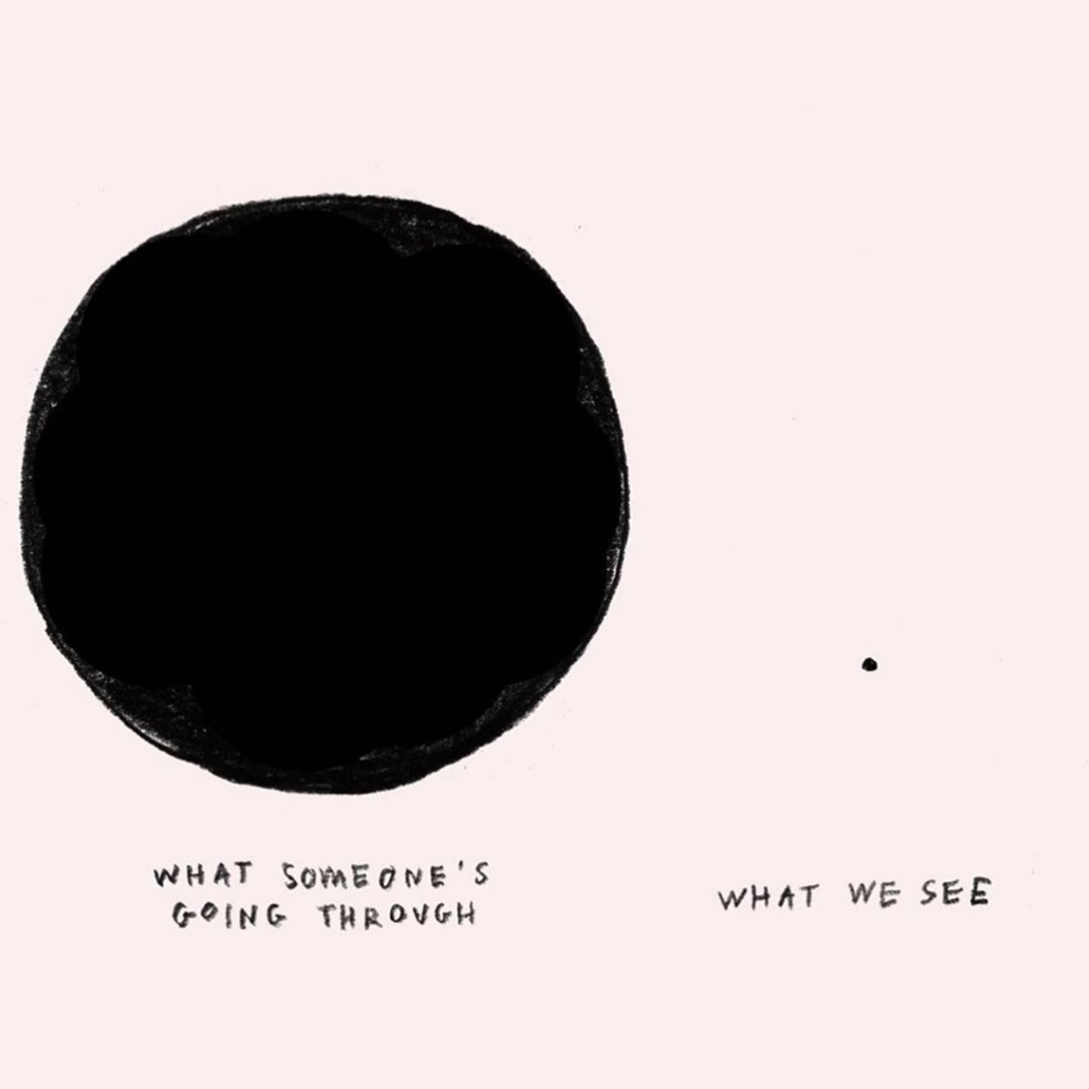
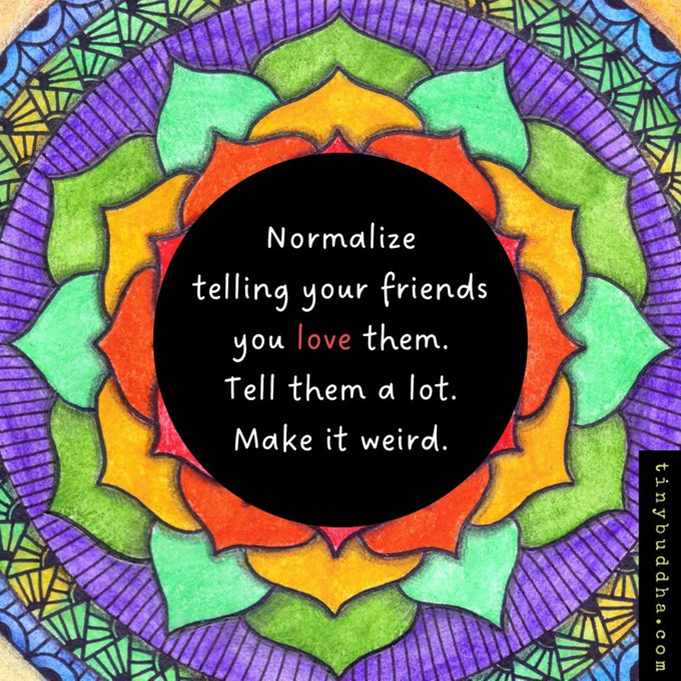
Tiny Buddha, @tinybuddha, Twitter, 3/16/22
A suicidal person may not ask for help, but that doesn't mean that help isn't wanted.
People who take their lives don't want to die—they want to stop hurting. It may be
hard to know how to help but talking openly about suicidal thoughts and feelings can
save a life.
Victor Armstrong, @1of2vics, Twitter, 3/24/2021
Life can be challenging. That’s part of the human experience. But if your challenge
is that you’re experiencing depression, anxiety, or even suicidal thoughts, you don’t
have to face the challenge alone. Talk to someone. There is no weakness in asking
for help.
Victor Armstrong, @1of2vics, Twitter, 2/11/22
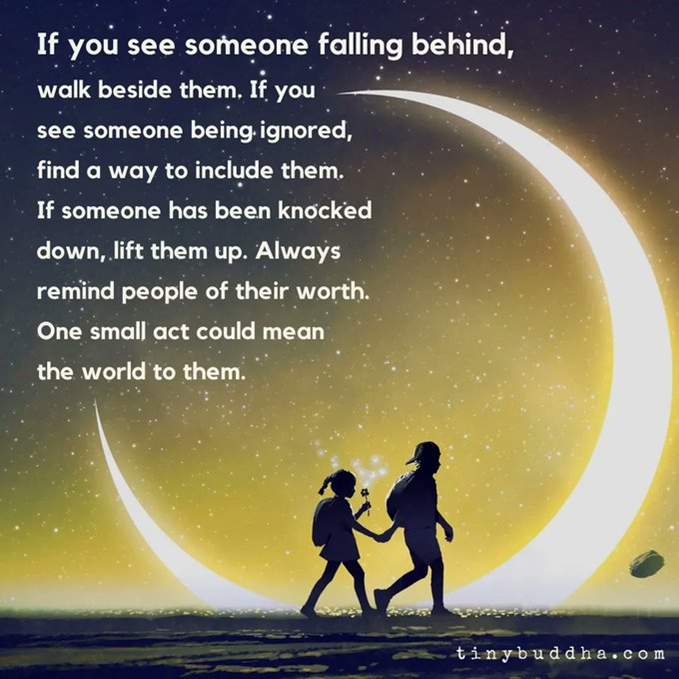
Tiny Buddha, @tinybuddha, Twitter, 2/24/22
Remind yourself how far you’ve come. #mindfulness
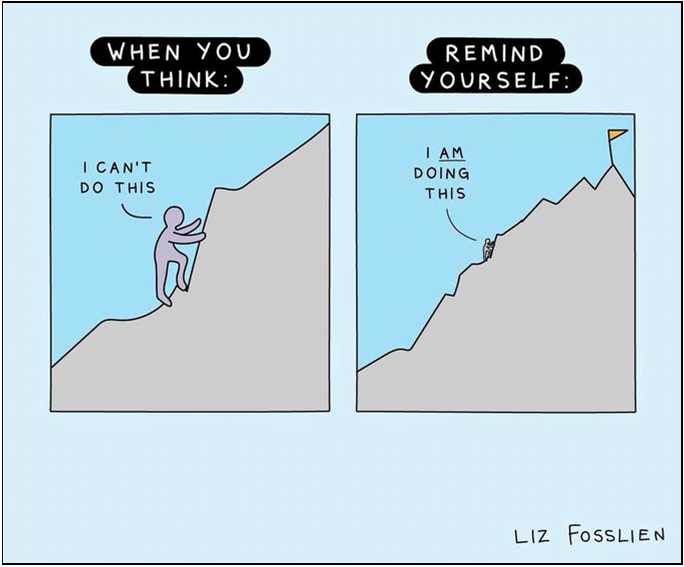
Everyday Mindfulness, @MindfulEveryday, Twitter, 1/31/2022
Stigma influences treatment. People living with addiction are often hesitant to access care due to fear of being judged, not only by friends and family but also by their provider. The language and labels we use matter. Addiction is a disease, not a character flaw.
#StopSuicide
Victor Armstrong, MSW, @1of2vics Twitter, 2/10/22
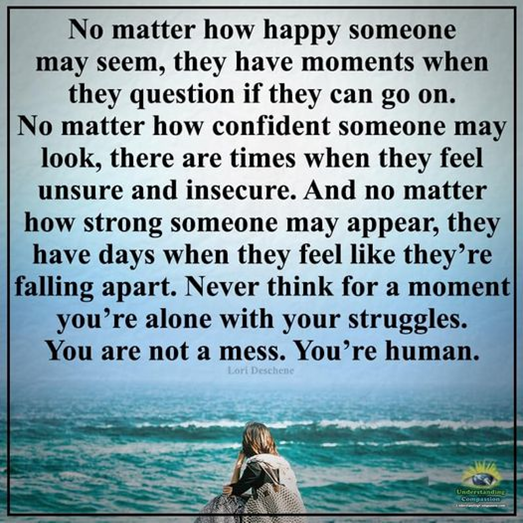
Some of you are unaware of just how amazing you really are. The way you make people laugh, lift others up, or spread some extra love. You do this even though you are struggling too, and I think it makes you such a beautiful human being.
-unknown
inspiringandpositivequotes.com
Talking about suicide is scary. I get it. People fear what they don’t understand. Understanding starts by talking about the issue, rather than avoiding it, supporting those that are hurting, and advocating for mental health awareness within our communities.
Victor Armstrong, MSW, @1of2vics, Twitter, 1/18/2022
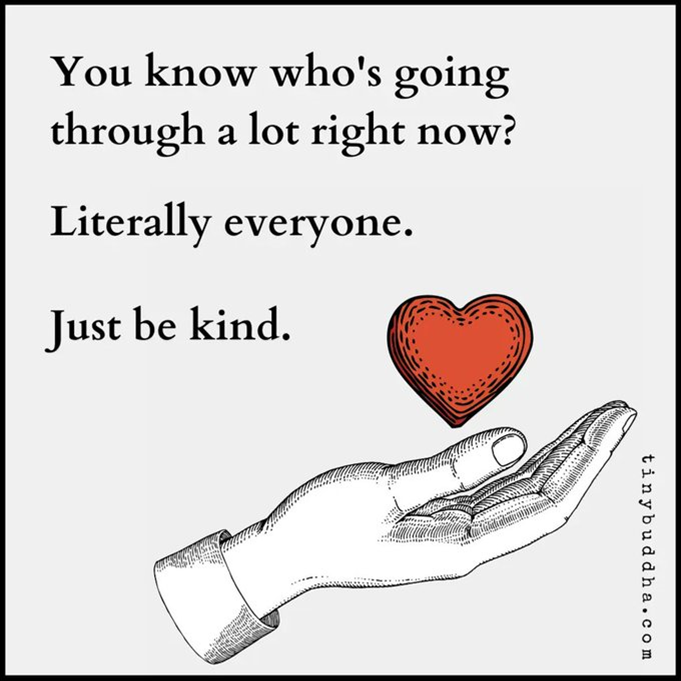
Tiny Buddha, @tinybuddha, Twitter, 1/13/22
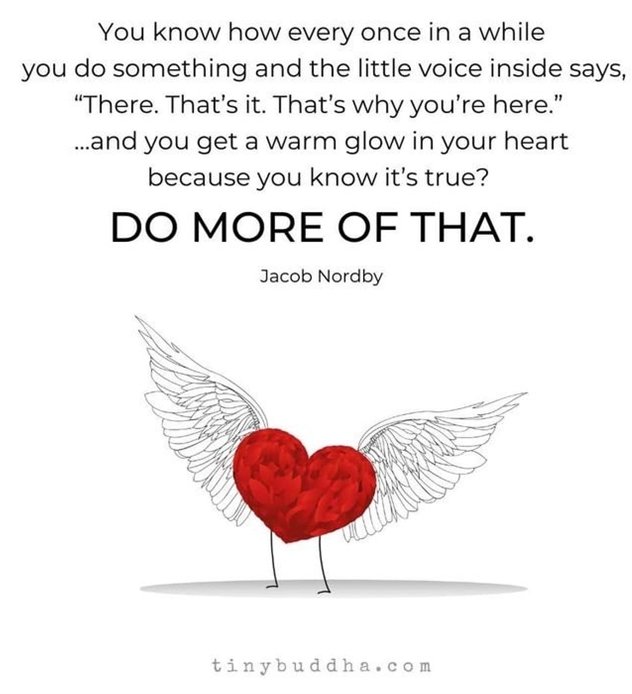
Tiny Buddha, @tinybuddha, Twitter, 12/13/2021
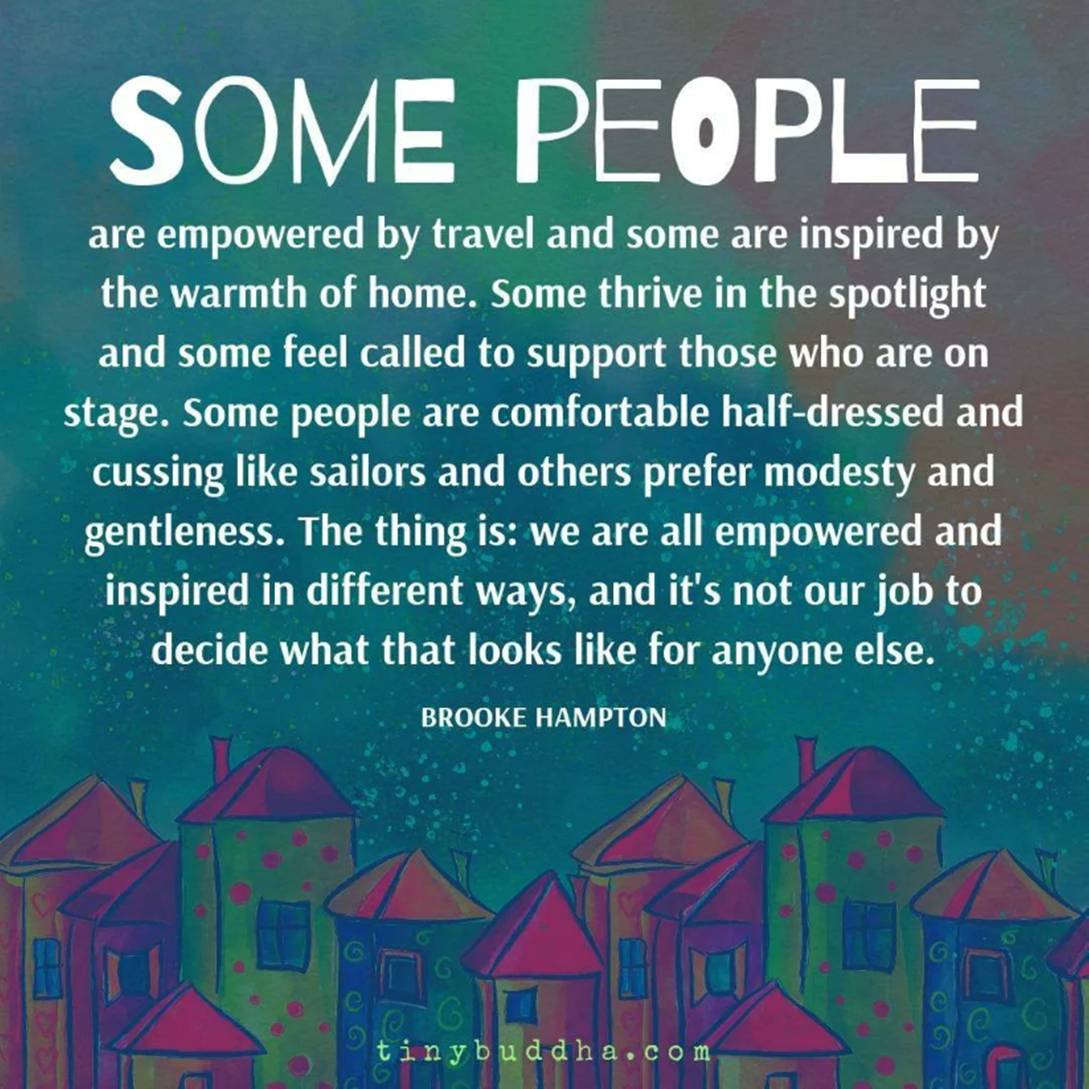
Tiny Buddha, @tinybuddha, Twitter, 12/21/21
Put down your phone. Your texts and emails will be there later. The person in front of you will not.
Why presence is the best gift you’ll ever give:
https://buff.ly/2BXFmgm

Tiny Buddha, Twitter @tinybuddha, 11/24/2021

Tiny Buddha, @tinybuddha, Twitter, 12/6/2021
Mental health is more than a diagnosis. It is your overall emotional & mental wellbeing, including both positive & negative elements, and it is impacted by many things. Let’s change the narrative from a conversation about mental illness to one about mental wellness. #StopSuicide
Victor Armstrong, MSW, @1of2vics Twitter, 12/4/2021
Be there. Be open. Be honest. Be kind. Be willing to listen, understand, accept, support,
and forgive. This is what it means to love.”
~Lori Deschene
Tiny Buddha, @tinybuddha, 11/25/2021
Volunteers for Recovery
Powder River County
Do you need help with shoveling snow, picking up groceries, cleaning your yard or putting up holiday decorations?
To change the way people see people in recovery, we’ve organized a “Volunteer Wednesdays”.
Contact Teri Wesland at 406-981-1736 to schedule volunteers.
“We can help”
When you practice self-care, you learn that you are enough, and you have enough to face life’s challenges. Remember, taking care of yourself doesn’t mean you are neglecting others. You have to replenish your own resources.
Self-care isn’t selfish.
It is essential.
#StopSuicide
Victor Armstrong, MSW, @1of2vics, 11/15/2021
Part of managing depression is recognizing when negative thoughts simply aren’t true.
Depression is a liar! It says things that aren’t true, even if it feels real. The
truth is, family, friends & loved ones are better off because you’re here. We all
are. Please stay.
#StopSuicide
Victor Armstrong, MSW, @1of2vics, 11/1/2021
A person contemplating suicide reaches out for connection, in the way they know how to. It’s not always in a way we recognize. We need to learn other ways to see people & recognize pain. It starts with ending the stigma surrounding suicide & openly talking about it.
#StopSuicide
Victor Armstrong, MSW, @1of2vics, 10/30/2021
When you find gratitude, however small, drink it in as much as is humanly possible.
It will make a difference to your mood and your frame of mind in general.
#mindfulness
Everyday Mindfulness @MindfulEveryday, 10/21/2021
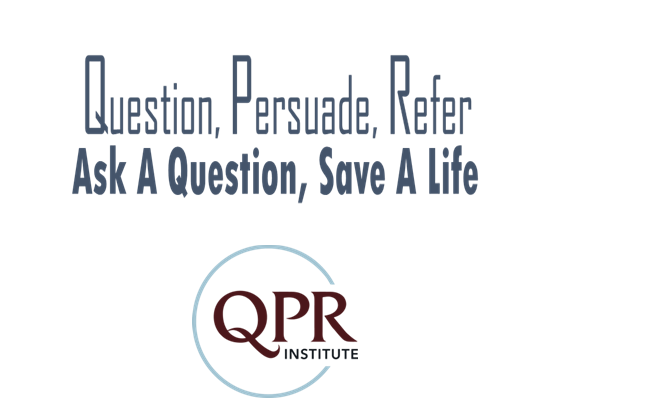
|
Date: Wednesday, October 27th, 2021 Time: 3:45 pm– 4:45 pm or Cost: FREE, Certification active for 2 years. Location: High School Library
|
“It’s OK to not be OK”
~Abbey Barnhart, PA-C
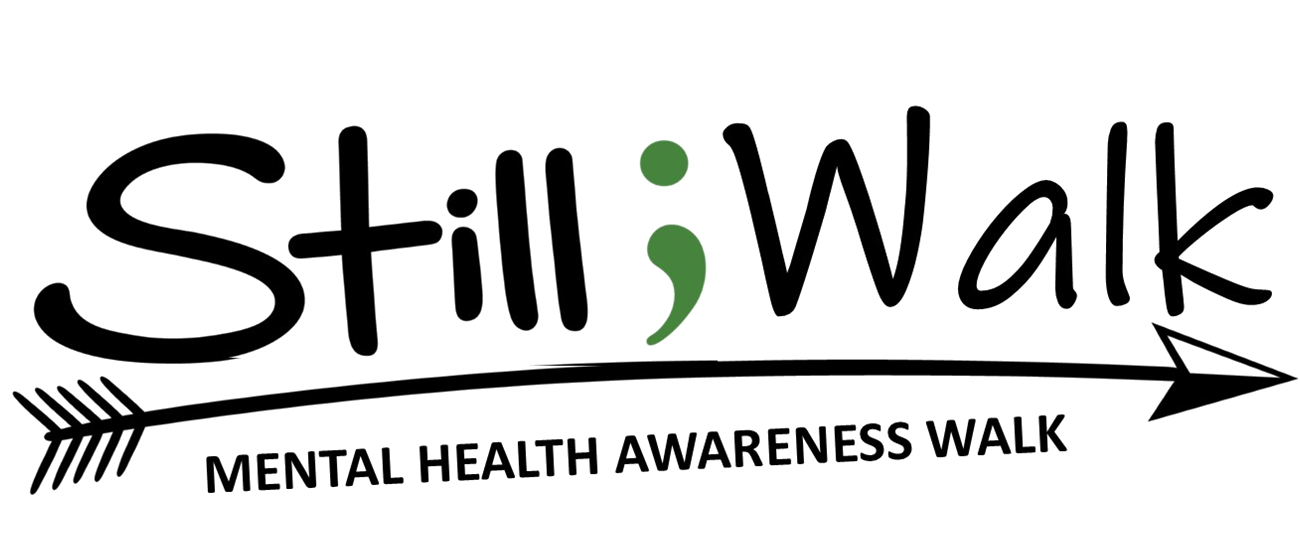
Saturday, October 9th
Walk 10:00 a.m. - Noon
Start at Courthouse Windmill
Choose your distance - 1 block to 6 miles
FREE Chili Lunch @ Noon
Raise awareness for mental health & recovery
Make Time to Relax
It might seem counter-intuitive to sit down and close your eyes during a stressful time, but sometimes, the most productive thing you can do is take a couple of minutes to breath and relax. Intentional relaxation slows our heart rate, reduces blood pressure, and can help you think more positively and react to stressful situations with more concentration and effective decision making.
Is it time to rethink your relationship with alcohol?
Many people are living with alcohol dependence. It’s not a personal or moral failing;
it’s a chronic disease that may make it hard to control your drinking and can affect
your physical and mental health, as well as cause problems with family, friends, and
work.
How you feel about your drinking may be complicated. Alcohol is a widely accepted
part of our culture, in good times and bad. But if the consequences of your drinking
are piling up, if you’re finding it hard to stop, or if drinking is replacing other
activities you used to enjoy, it may be time to talk to your healthcare provider to
learn more about alcohol dependence.
Go to www.myrelationshipwithalcohol.comto find education, a questionnaire, personal stories, and potential next steps to
explore.
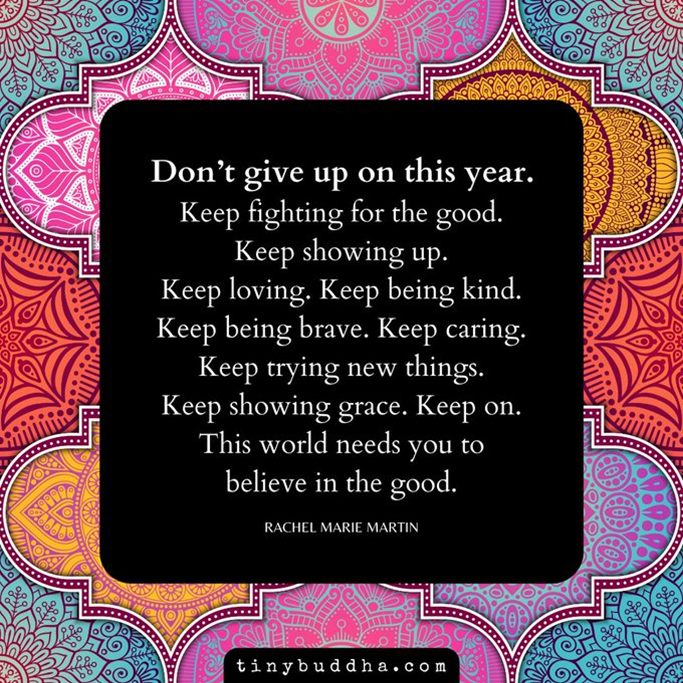
@tinybuddha, 9/7/2021
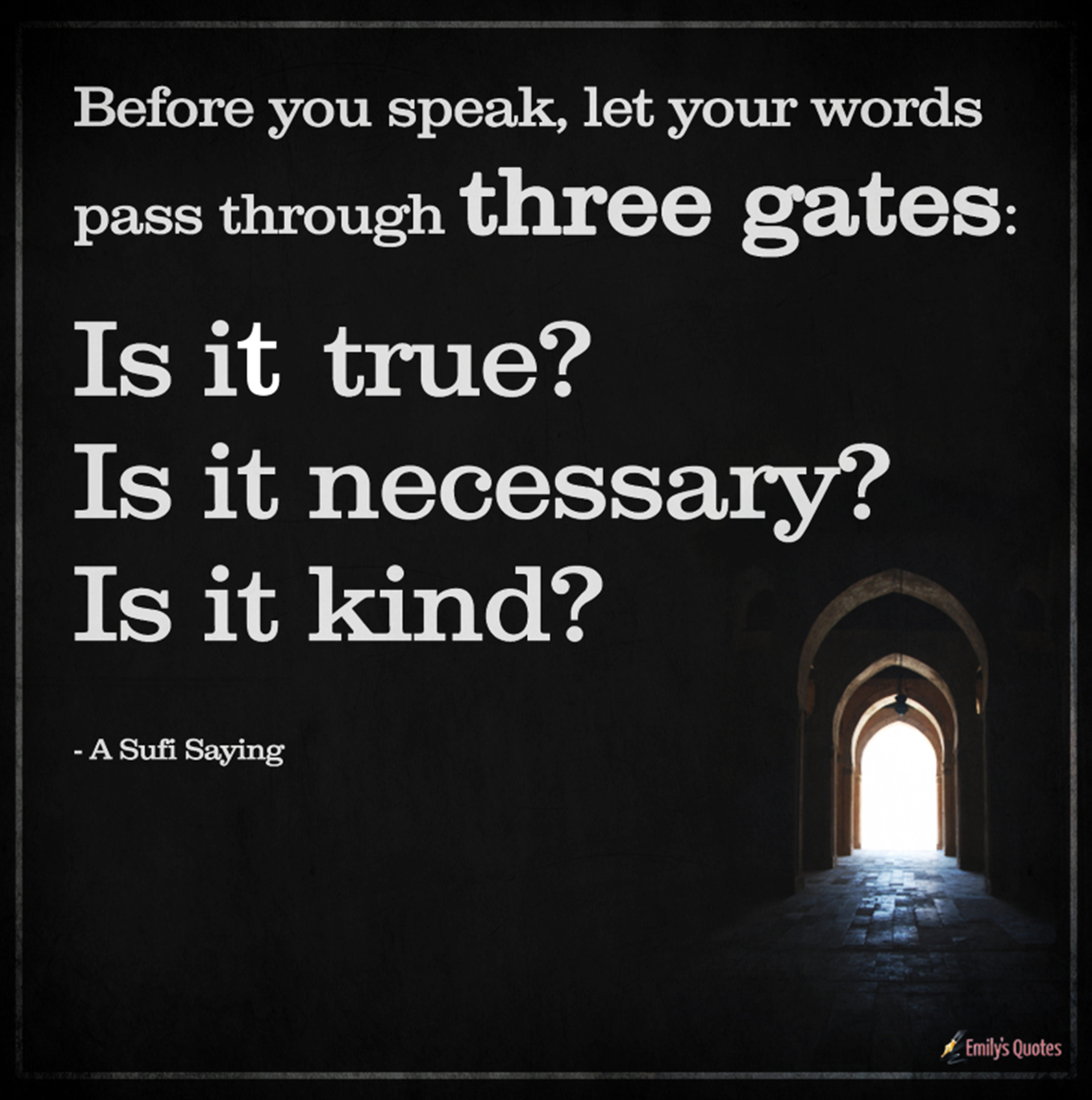
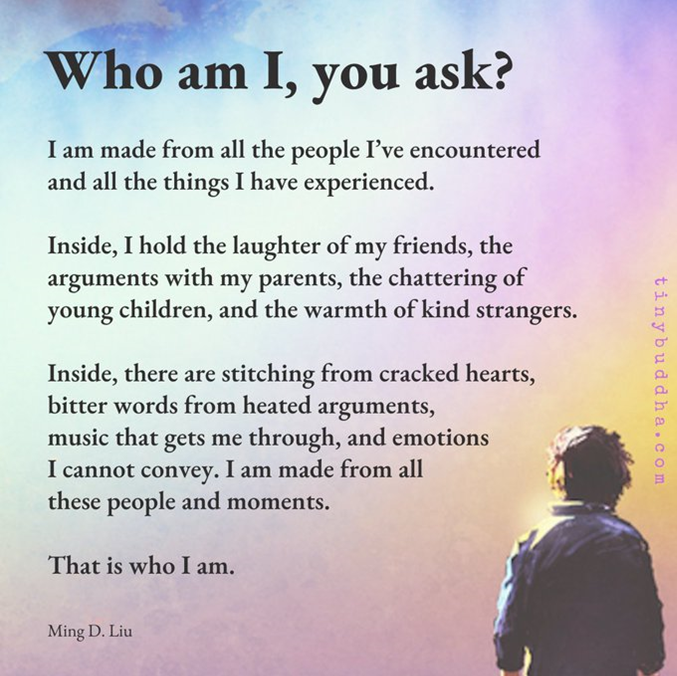
@tinybuddha, 8/18/2021
@tinybuddha, 8/12/2021
Learn to de-stress without alcohol.
Learn to unwind without that cold beer, glass of wine or cocktail. Even though alcohol use is very common, alcohol is a toxin and can adversely affect your mental and physical health. Alcohol consumption increases the risk of liver, heart, pancreas, and brain diseases as well as colon, breast, oral, esophageal, rectal, and liver cancers.
How do you know if you need to rethink your alcohol consumption?
The National Institute on Alcohol Abuse and Alcoholism defines heavy alcohol use as:
- Men: over 4 drinks a day or more than 14 drinks per week.
- Women: over 3 drinks a day or more than 7 in a week.
Try these alcohol-FREE ways to wind down:
* Go outside, get some fresh air * Read a book
* Cuddle or play with your pet * Exercise
* Practice yoga * Try meditation
* Soak in the tub * Watch a comedy
Amen Clinics, August 11, 2021, https://www.amenclinics.com/
You belong.
Everywhere. Yes, you—with all your history, anxiety, pain. Yes, everywhere—in every
culture, community, circumstance. You belong in this body. You belong in this very
moment. You belong in this breath…and this one. You have always belonged.
~Sebene Selassie~
A Network for Grateful Living [email protected] 7/27/21
When you get annoyed at something that someone has said to you, that annoyance is
something of your own making.
#mindfulness 8/1/21 Everyday Mindfulness @MindfulEveryday
You cannot see your reflection in boiling water. Similarly, you cannot see the truth
in a state of anger.
Tiny Buddha@tinybuddha 7/23/21
@tinybuddha, 7/26/2021
@tinybuddha 7/14/2021
To MANAGE your STRESS – EXERCISE
One of the best things you can do to manage stress is to be more physically active. Exercise reduces adrenaline and cortisol, two stress hormones that can have negative
effects on both mental and physical health.
Moving more reduces fatigue, improves blood flow, and relieves feelings of tension, anxiety and
anger.
Movement and exercise don’t have to be hard, or even involve going to the gym!
=Go for a walk outside with a friend instead of catching up over
a beverage.
=Stand up and stretch during repetitive movements or
activities.
=Schedule in short movement breaks while operating
machinery or driving to increase blood flow and
concentration.
=Start slowly. Challenge yourself to increase the time spent
being active each week or go further each time you walk.
=Get the whole family involved in a yard game or group walk.
Go to the Montana Ag Producer Stress Resource Clearinghouse for more ideas for increasing
physical activity to manage stress.
https://msuextension.org/wellness/stress-management/mt_farm_stress_clearing_house/index.html
Tips on Managing Stress
Stress can be physical, mental, social, financial, or a combination. Stress is unavoidable, and we all experience stress in some form throughout our lives. This summer, grasshoppers and heat are adding to our stress. There are a few strategies and healthy habits that can both reduce stress and protect against the negative effects stress can have on the body.
- Exercise regularly
- Make time to relax
- Eat healthy meals
- Limit alcohol and caffeine
- Prioritize quality sleep
- Talk to others: A professional, family or friends.
For more information, go to
https://msuextension.org/wellness/stress-management/mt_farm_stress_clearing_house/index.html.
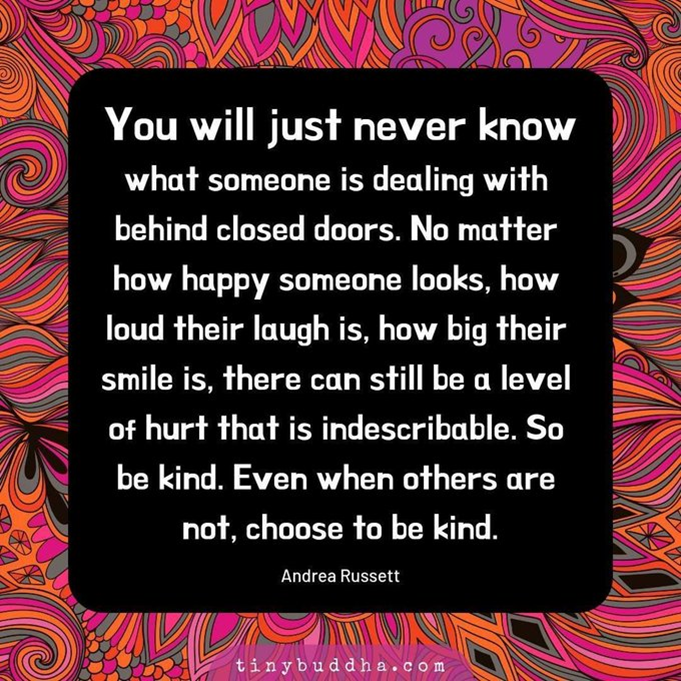
Twitter @tinybuddha, 6/22/2021
Are you feeling anxious or depressed?
Try Thrive by Waypoint Health, a confidential, online program for people who want to take charge of their emotional well-being to lead happier, more satisfying lives. Thriveteaches skills to help people communicate more effectively and deal with stress, depression and anxiety. This online program is FREE for all adult Montanans at thriveforMontana.com.

Thrive* by Waypoint Health is sponsored by Montana DPHHS and MSU’s Center for Mental Health Research and Recovery.
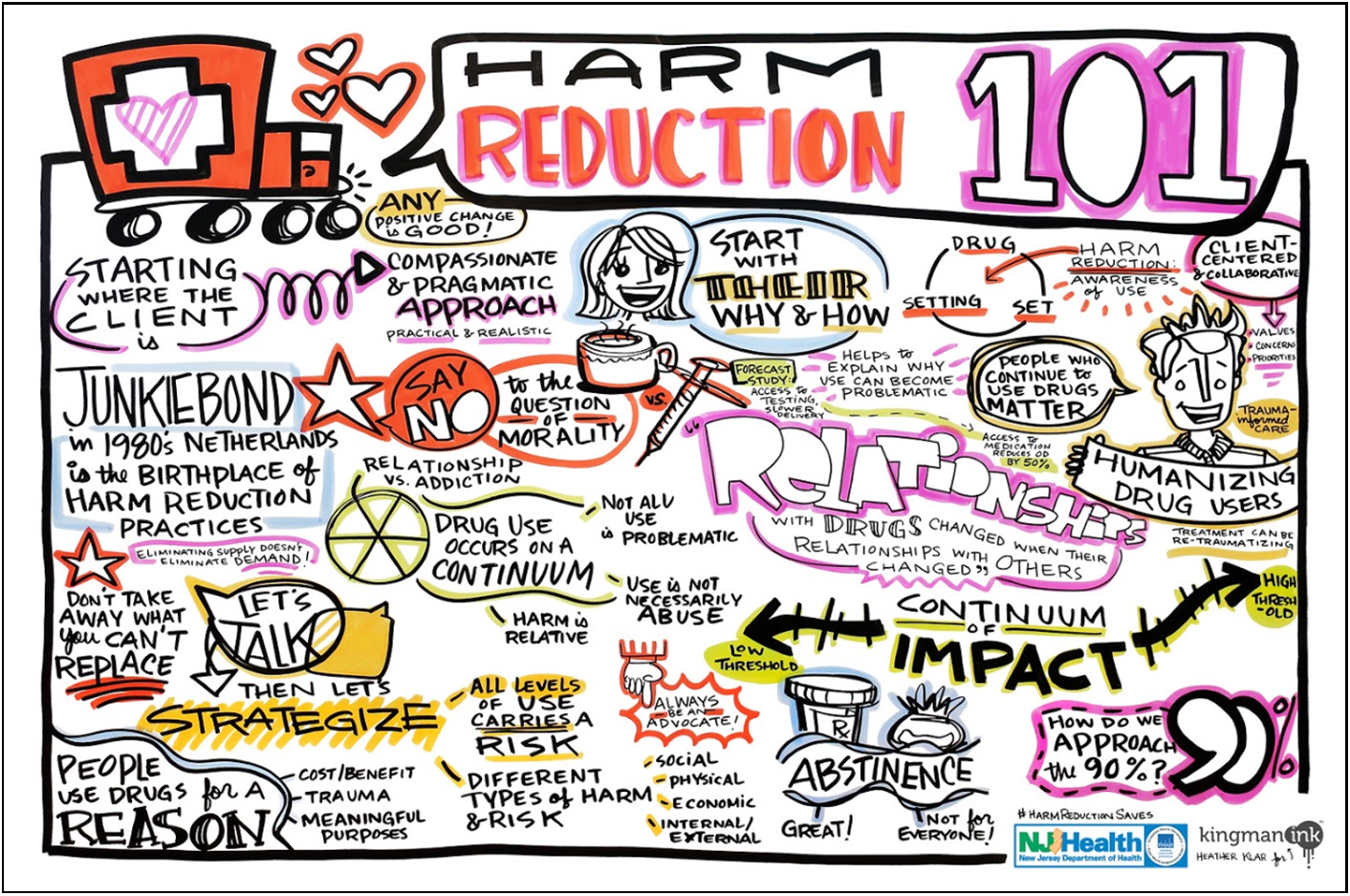
Shiela Vakharia PhD MSW @MyHarmReduction 6/13/21
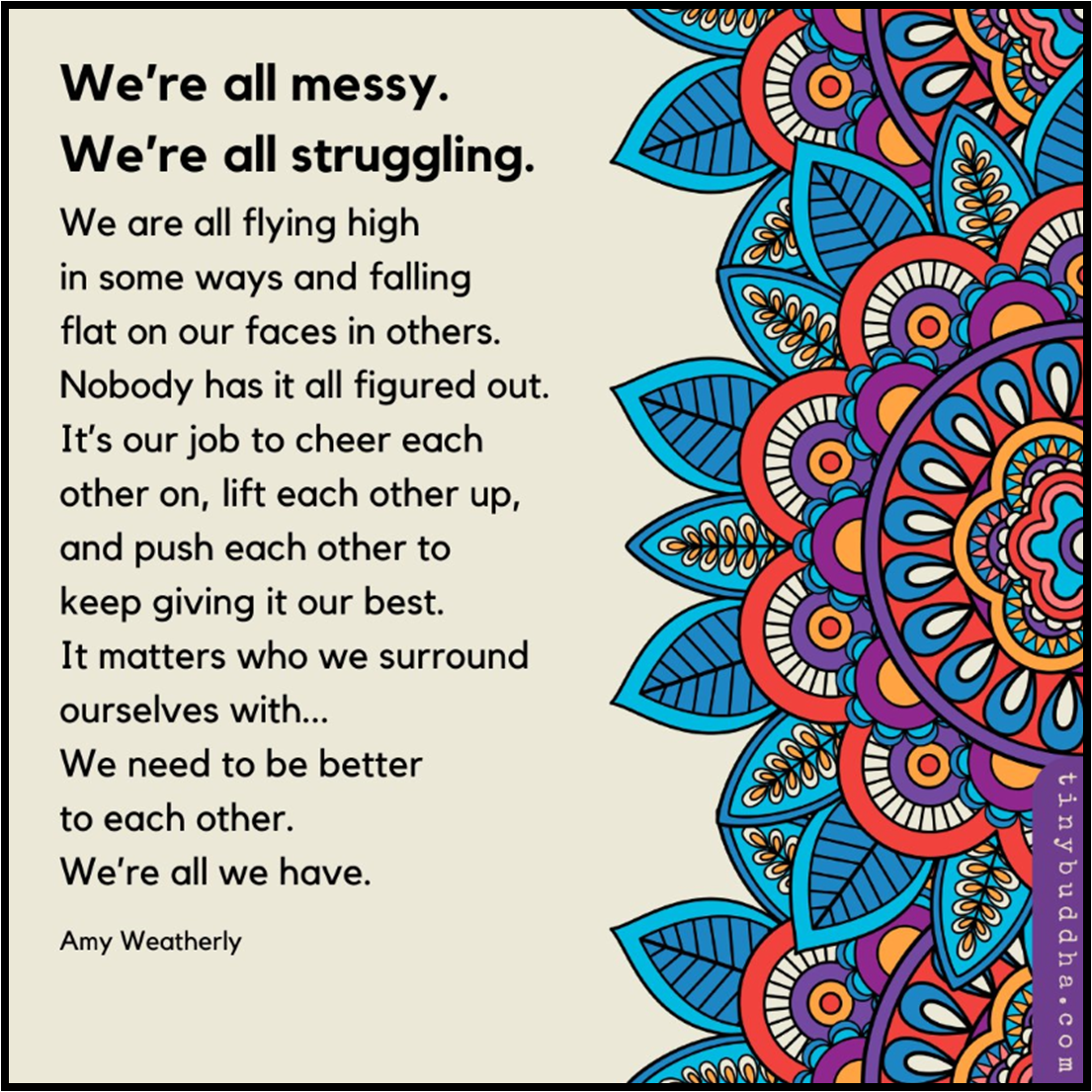
Amy Weatherly @tinybuddha 6/3/21
Sit with it.
Sit with it. Sit with it. Sit with it. Even though you want to run. Even when it’s heavy and difficult. Even though you’re not quite sure of the way through. Healing happens by feeling.
Dr. Rebeca Ray @tinybuddha 3/28/21
Give thanks.
For that car that is broken, give thanks that you have a car to fix. For that expensive home repair, give thanks and realize what a gift it is to even have a home. For that taxing job, give thanks that it pays the bills.
Daphne Greer @tinybuddha 3/28/21
Treat Yourself with Compassion
We treat friends and loved ones more gently than we treat ourselves. We are our own
worst enemy. One barrier to self-compassion is the negativity bias. The human brain has a bias toward the negative, which means we remember and ruminate
on the negative.
3 strategies for awakening self-compassion:
Soothing touch: The next time you find yourself speaking unkindly to yourself, place one or both
hands over your heart and take a few breaths. Physical touch releases oxytocin (hormone
associated with love, empathy and trust), and soothes distressing emotions.
Softening words of self-criticism: When you catch yourself saying something like “I never get anything right”, you
might try “I will get it next time” or “I’m learning and growing every day.”
Loving Kindness Meditation: There are three stages to this meditation. Offering words of loving-kindness to yourself,
a neutral person, and a challenging person. Start slow. Take it in stages.
Crawford, M (2021, April 8) Refill Your Cup with Self-Care. Illinois Extension. https://extension.illinois.edu/blogs/refill-your-cup-self-care
Prescription Opioid & Stimulant Misuse in Rural Montana: From Insight to Education
http://health.msuextension.org/opioid_misuse.html

Warning Signs of Suicide
When you notice a warning sign, start a conversation by saying, “Hey, you’re not yourself these days.” And be specific about what you’ve noticed.
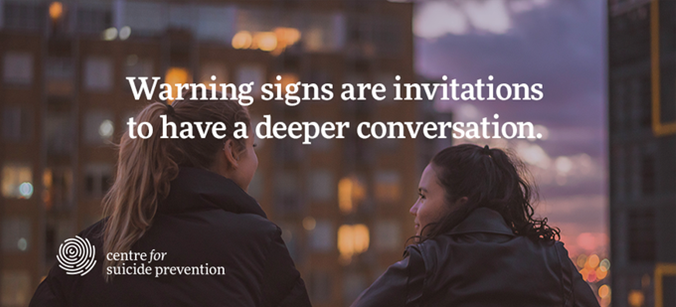
@cspyyc (Suicide Prevention), Twitter, 5 May 2021
Tips for nourishing all of you:
When we feel balanced, we “go with the flow” of life’s cycles and seasons smoothly and easily. When we feel out of balance, we may experience loneliness, feelings of abandonment, poor boundaries and an inability to find pleasure and nourishment in our relationships.
Think of self-nourishment as feeding yourself physically, emotionally, mentally and
spiritually.
Physically: Eat whole foods, exercise most days of the week, and go to bed on time.
Emotionally: Give yourself permission to feel all your feelings. Recognize that every emotion is there for a reason and has something to teach us.
Mentally: Practice mindful eating and/or breathing. Take a social media break once a week. Limit the amount of news you take in.
Spiritually: Pray, meditate, read spiritual books, spend time in nature.
Play: Play feeds all aspects of self. Give yourself permission to add something fun to
your to-do list.
Crawford, M (2021, March 24) Refill Your Cup with Self-Care. Illinois Extension.
https://extension.illinois.edu/blogs/refill-your-cup-self-care
YOU are ENOUGH!
The greatest challenge for most of us is believing that we are worthy right now, right this minute. Worthiness doesn’t have prerequisites. So many of us have knowingly created/unknowingly allowed/been handed down a long list of worthiness prerequisites:
I’ll be worthy when I lose twenty pounds.
I’ll worthy if I can get pregnant.
I’ll be worthy if I get/stay sober.
I’ll be worthy if everyone thinks I’m a good parent.
I’ll be worthy when I can make a living selling my art.
I’ll be worthy if I can hold my marriage together.
I’ll be worthy when my parents finally approve.
I’ll be worthy if he/she calls back and asks me out.
I’ll be worthy when I can do it all and look like I’m not even trying.
The truth is YOU are worthy right NOW. Let go of the “ifs” and “whens”. Claim your worthiness.
You are worthy NOW, right this minute. As is!
Brown, B. (2010) The Gifts of Imperfection. Let go of who you think you’re supposed to be and embrace who you are. Hazelden Publishing
Find Your Base of Support
When we feel supported, we feel fully supported at all moments of life’s journey.
When we are out of balance, we experience fear and insecurity. We can cultivate qualities
of support or grounding to help us in times of stress.
Activities that encourage grounding:
Eating well: Eat whole fruits, vegetables and grains.
Limit heavily processed foods high in refined sugars.
Working: Any type of work (housework, volunteering or
paid work) that includes focus and repetition provides the
basic structure to build a strong foundation.
Walking Meditation: Mindfully notice each step.
Foot massage: All massage aids in connecting with the
body. Foot massage is especially helpful.
Sitting or lying on the earth: Put down a blanket, have
a picnic, or simply spend time sitting under a favorite tree.
During transitions, whether it is a new job, end of a relationship or change of seasons,
grounding is especially important. When we feel secure, well fed and healthy, our
attention and energy can easily flow to care for other areas of our lives.
Crawford, M (2021, March 17) Refill Your Cup with Self-Care. Illinois Extension.
https://extension.illinois.edu/blogs/refill-your-cup-self-care
What can you do to combat stigma?
Know that many people experience mental health issues. If you have a mental health issue, you are not alone. One in four Americans experience a mental health issue.
Find support. Stay connected to others and get support from organizations such as the National Alliance on Mental Illness (NAMI). NAMI offers educational and supportive resources.
Speak out. Educate people about the realities of mental health issues and its prevalence. Actively speak out against stigma. Debunk myths. If a family member or friend makes a disparaging remark, educate them and have a no-tolerance policy for negative, hurtful comments.
With education and awareness, stigma can be eliminated.
Caddell, J. July 30, 2020. https://www.verywellmind.com/mental-illness-and-stigma-2337677
STIGMA is discrimination against someone based on a mental illness, substance use disorder (SUD), health condition, or disability. Sadly, mental health stigma is common, leads to delays in treatment, and reduces the chances that a person with mental health issues will receive appropriate and adequate care.
Stigma is perpetuated by:
- Media depictions where the villain is often a character who has a mental health issue or SUD;
- Harmful stereotypes of people with mental health issues;
- Treating mental health issues or SUD as if they are something people can overcome if they "try harder" or "snap out of it;"
- Using phrases like "she's crazy" or "he's nuts" to describe other people or their behavior;
- Halloween costumes that depict people with mental illness as violent and dangerous.
Awareness is the first step in reducing Stigma.
Caddell, J. July 30, 2020. https://www.verywellmind.com/mental-illness-and-stigma-2337677
10 Steps to Happiness
Hate less, love more.
Worry less, dance more.
Take less, give more.
Consume less, create more.
Frown less, smile more.
Talk less, listen more.
Fear less, try more.
Judge less, accept more.
Watch less, do more.
Complain less, appreciate more.
Everyday Mindfulness @Mindfulness 3/14/21
People will teach you…
People will teach you how to love….by not loving back.
People will teach you how to forgive….by not
apologizing.
People will teach you kindness…. by their judgement.
People will teach you how to grow…..by remaining
stagnant.
Pay attention when you’re going through painful and
mysterious times.
Listen to the wisdom life is trying to teach you.
--Meredith Marple
Tiny Buddha @tinybuddha
|
Practice the PAUSE
Lori Deschene @tinybuddha |
Call the Montana Crisis Recovery Hotline to receive FREE and CONFIDENTIAL counseling services from trained crisis counselors. The service helps people navigate feelings of isolation, loss, fear, uncertainty, depression, and anxiety.
Montana Crisis Recovery Line
1-877-503-0833
Monday-Friday
10 a.m. to 10 p.m.
The program is sponsored by the Montana Department of Public Health and Human Services (DPHHS) and the Disaster and Emergency Services.
“Smile every chance you get; not because life has been easy, perfect, or exactly as
you had anticipated, but because you choose to be happy and grateful for all the good
things you do have, and all the problems you know you don’t”
-Everyday Mindfulness
Too Much Noise
These days, there is no shortage of information. From cell phones to computers, our
senses are in overdrive. Sensory overload occurs when one or more of our five senses
becomes overstimulated, like when music is too loud our sense of hearing may become
overloaded.
In yoga tradition, it is said that our senses are governed by the mind, the mind
by the breath, and the breath by the nerves. With no guidance, our senses will carry
our attention outward, like horses running wild.
But, when our attention is inwardly concentrated, we are less distracted by the external sights, sounds, and other senses.
Like a turtle that withdraws into its shell for safety and restoration, a break from
our senses restores and calms our brain and nervous system.
As the senses rest, the mind and emotions become calm and serene. Practice calming
your senses by deep breathing, mindful eating, scheduling time away from your cell
phone and bringing awareness to what you read or watch on television.
“When we turn our attention fully to the inner movement of
the breath, our senses lose their acuity in relation to the
external world.”
B.K.S. Iyengar
Crawford, M (2021, February 3) Refill Your Cup with Self-Care. Illinois Extension.
https://extension.illinois.edu/blogs/refill-your-cup-self-care
The things you worry about vs the things that actually happen…
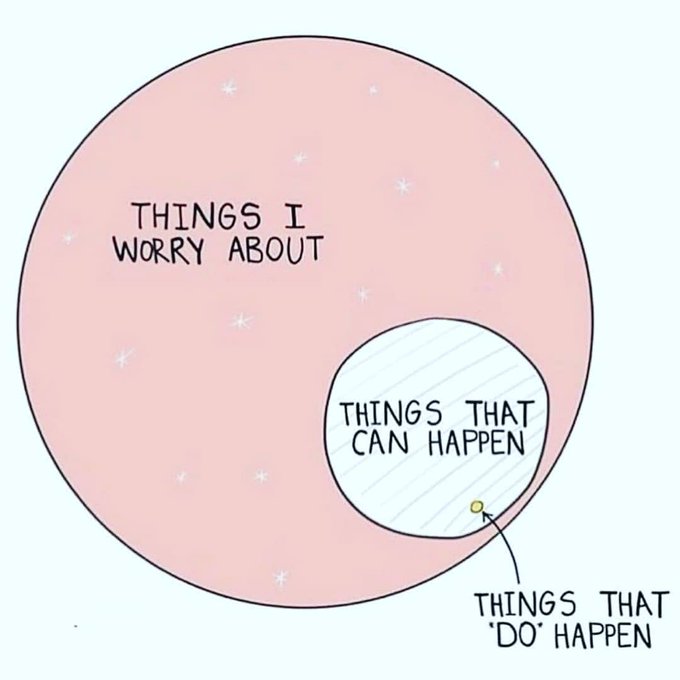
Everyday Mindfulness Tweet @MindfulEveryday - February 6, 2021
The stories we tell ourselves or the “internal narratives and assumptions we make about how our world operates” are NOT always accurate. To honor and gradually release our limiting beliefs, we need to learn the art of witnessing.
Witnessing involves observing our limiting beliefs WITHOUT identifying with them. Everyone has limiting beliefs. These beliefs include: “I don’t deserve”, “I’m not smart enough”, or, “there’s no point in trying”. These harsh statements come from our inner critic. Everyone has an inner critic, even the most confident people you know.
The good news is once you have identified your limiting beliefs; you can REFRAME them. Witnessing is an ever-evolving process, not a “one and done.” As we refine the MUSCLE of witnessing, we align with our true being more completely.
To identify and challenge your limiting beliefs, ask yourself:
- What am I believing right now?
- Is it true?
Simply by asking these questions, it creates space and opens the possibility that what you are believing is a representation and not the reality of what is really happening. The belief is real, but not true.
Counter limiting beliefs through meditation, reflection, and sources of nourishment such as good company, spiritual literature, and selfless service to others. This mantra may help:
“Through the gradual release of limiting beliefs, I continue my journey with greater
clarity.”
Crawford, M (2020, November 24) Refill Your Cup with Self-Care. Illinois Extension. https://extension.illinois.edu/blogs/refill-your-cup-self-care
Feeling Worn to the Bone?
Are you feeling fatigued, chronically tired, or hopeless? Are you experiencing
impaired decision-making? Does it feel like everything is outside of your control.
While many things are outside of our control, we do have control over ourselves.
If we have agency, we have a feeling of control. We can develop agency by choosing how we spend our
time, our outlook on life, and how we interact with others. Shifting our focus to
what we CAN do, increases our sense of agency.
How do we build agency when we are experiencing fatigue?
*Engage in self-regulating practices: Breathing, meditating,
taking a walk, journaling
*Minimize stressors: Set limits on the amount of news you
take in and how often you engage with social media
*Stay connected to others: Following local guidelines, decide what
feels best for you be it socially distanced or connecting through
technology.
*Recognize “Okayness.” Take time for gratitude, for being
alive and being okay in the moment.
*Find pleasure in simple things: Enjoying a cup of coffee,
playing with a pet, watching the sunset, talking with your
children.
Notice that none of these suggestions are extreme or drastic. When feeling depleted,
it is okay to slow down.
“When you learn to slow down, you go further.” – Bruce Perry
Crawford, M (2021, January 21) Refill Your Cup with Self-Care. Illinois Extension. https://extension.illinois.edu/blogs/refill-your-cup-self-care
Don’t just DO something, BE there!
Last week, did you experience more doing, or being? For many, the answer is doing. We live in a fast paced, goal driven world, a society
of doers.
What does it mean to “be?” Being can be described as “resting in experience” and
“fully present and aware of whatever is here, right now.”
Being is the opposite of doing. Doing is completing tasks, getting things done. Doing is essential in following
your dreams, making a living, and caring for yourself and your family.
One is NOT better than the other. Our challenge is to find a balance between the two. Can you think of being and doing in collaboration, rather than operating combatively. Individuals often get trapped
in the doing, trying to reach the destination, without awareness of the journey.
To help you BE, think about:
*Where does your sense of being move to when you are doing
well? When you are not doing well?
*Can you rest in who you are when you feel supported, when
not running on empty?
Meditation and breath work are two effective strategies for experiencing being. It’s as simple as taking one
conscious breath, following the inhale and the exhale all the way through. Practice
coming to your breath several times a day to enhance your sense of being.
Crawford, M (2021, January 14) Refill Your Cup with Self-Care. Illinois Extension. https://extension.illinois.edu/blogs/refill-your-cup-self-care
Kaizen …. Small Continuous Change
Making personal change is no easy task. As strongly as you may desire to leave grief,
loss and uncertainty behind with 2020, the truth is these challenges continue in 2021.
As tempting as it may seem to make a promise to yourself to drastically change the way you eat, handle stress or generally take care of yourself, apply the
concept of Kaizen instead.
Kaizen is a business philosophy that encourages continuous improvement. Apply Kaizen to self-care
and make “small, continuous change” rather than starting out with one large goal.
Break down larger goals into small action steps. What is one thing you can do
today (or tomorrow) and continue to do on a regular basis that will help you achieve
your goal?
*If you want to get more sleep, instead of going to bed
an hour earlier, start with 10-15 minutes.
*If you want to eat healthier foods, start with adding a
fruit or vegetable to one meal a day.
As you accomplish these small goals, you will be energized to make another small
change, and then another. These small changes will help you accomplish your larger
goal.
Crawford, M (2021, January 6) Refill Your Cup with Self-Care. Illinois Extension. https://extension.illinois.edu/blogs/refill-your-cup-self-care
Letting Go - A Journey Toward Freedom
Two-year olds are typically in the “it’s mine” phase, which is when they begin
to understand the concept of a person’s invisible tie to a thing, according to psychologist,
Susan Gelman, Ph.D. When two-year-olds cling to possessions, they are trying to make
sense of their world. As adults, we sometimes respond in the two-year-old phase by
holding on to and acquiring possessions or by defining ourselves by what we own.
We notice this phase when our physical possessions clutter our space so much that
it makes it difficult to move about. We clutter our minds by clinging to rigid thoughts,
ideas and expectations which inhibit our ability to expand and grow.
The tighter we hold onto things, the more power or hold those things have over
us. Try instead to practice generosity and notice how much more expansive and light
we become, no longer held down by our attachment to physical and emotional “stuff”.
Practice self-care this week by looking at the physical things in your surroundings.
Do these things make you feel free and light or do they have a hold on you and make
you feel heavy? Practice non-hoarding, non-greed, non-clinging… a sense of freedom
and the ability to let go.
“A bird cannot hold its perch and fly. Neither can we grasp anything and be free.” – Deborah Adele
Crawford, M (2020, September 16) Refill Your Cup with Self-Care, Illinois Extension.
https://extension.illinois.edu/blogs/refill-your-cup-self-care
What is an EVERYDAY moment that brings you JOY?
It’s the little things in life that bring us the most joy. It may be spending time with family, enjoying a cup of coffee, taking a walk, a daily prayer or meditation practice.
Due to the brain’s negativity bias, the everyday joyful moments are likely to fade
into the background while painful or harmful experiences move to the forefront of
our awareness. To encourage the lasting value of positive experiences, psychologist
Rick Hanson suggests absorbing the experience. Hanson suggests:
* sensing the experience sinking into you
* imagine the experience like a warm soothing balm,
or a jewel placed in the treasure chest of your heart.
Joy isn’t something we can go and find, but rather something to uncover. To connect to joy, ask yourself “what are the barriers I have built against it?”
Your task is not to seek for love, but merely to seek and find all the barriers within yourself that you have built against it. -- Rumi
Crawford, M (2020, December 2) Refill Your Cup with Self-Care. Illinois Extension.
https://extension.illinois.edu/blogs/refill-your-cup-self-care
Watch these 5 minute videos of real-life recovery stories from real people in MT who have recovered from Opioid Misuse & shared their stories with the hope of saving a life.
https://powderriver.msuextension.org/OpioidPrevention.html
- A Montana mother of four, Nicole Whitford, who was addicted to hydrocodone while dealing with a degenerate disc disease
- Jason Cox, Missoula, discusses the four phases of his recovery from opioid addiction which began from a high school sports injury
- Montana Rancher Tells his Recovery Story
Additional resources:
- Opioid Misuse: Taking Prescription Opioids Safely (video)
- MontGuide “Prescription Opioid Use and Misuse in Montana” (available on-line or at the MSU Powder River Extension Office)
Coping with Loss
The loss of a loved one is life's most stressful event and can cause a major emotional crisis. After the death of someone you love, you experience bereavement, which literally means "to be deprived by death."
Knowing What to Expect
When a death takes place, you may experience a wide range of emotions, even when the death is expected. Many people report feeling an initial stage of numbness after first learning of a death, but there is no real order to the grieving process. Some emotions you may experience include:
=Denial =Yearning
=Disbelief =Anger
=Confusion =Humiliation
=Shock =Despair
=Sadness =Guilt
These feelings are normal and common reactions to loss. You may not be prepared for the intensity and duration of your emotions or how swiftly your moods may change. You may even begin to doubt the stability of your mental health. Be assured that these feelings are healthy and appropriate and will help you come to terms with your loss.
Remember: It takes time to absorb the impact of a major loss. You never stop missing your loved one, but the pain eases after time and allows you to go on with your life.

How Stress Can Affect Youth
Stress can affect youth emotionally, physically, and socially. Warning signs of stress in youth in those categories are:
Emotional
¨ Acting out (physically or verbally, out of character)
¨ Mood swings
¨ Depression
¨ Excessive sleeping
¨ Lack of motivation
¨ Anxiety
Physical
¨ Excessive tiredness
¨ Trouble sleeping
¨ Headaches
¨ Tension
(muscles in back or neck)
¨ Excessive sickness & absenteeism
¨ Butterflies in stomach
¨ Experimentation with use of drugs & alcohol
Social
¨ Change in normal routines, temperament & behavior
¨ Change in friends who influence in negative ways
¨ Loss of interest in extracurricular activities
¨ Dropping out of social engagements
¨ Isolation
Shogren, M., Landwehr, R., Terry, D., Roach-Moore, A., & McLean, A. (2020). AUDIT-C Form. Depression, Alcohol and Farm Stress: Addressing Co-Occurring Disorders in Rural America. Substance Abuse and Mental Health Service Administration, 21.
Risky and Harmful Alcohol Use - Effects on the Body

Shogren, M., Landwehr, R., Terry, D., Roach-Moore, A., & McLean, A. (2020). AUDIT-C Form. Depression, Alcohol and Farm Stress: Addressing Co-Occurring Disorders in Rural America. Substance Abuse and Mental Health Service Administration, 21.
Are You Drinking Too Much?
Take this test, to score yourself;
1. How often do you have a drink containing alcohol?
a. Never
b. Monthly or less
c. 2-4 time a month
d. 2-3 times a week
e. 4 or more times a week
2. How many standard drinks containing alcohol do you have
on a typical day?
a. 1 or 2
b. 3 or 4
c. 5 or 6
d. 7 to 9
e. 10 or more
3. How often do you have six or more drinks on one occasion?
a. Never
b. Less than monthly
c. Monthly
d. Weekly
e. Daily or almost daily
Scored on a scale of 0-12;
a=0 points, b=1 point, c=2 points, d=3 points, e=4 points
IN MEN: a score of 4 or more IN WOMEN: a score of 3 or more indicates you may have an Alcohol Use Disorder (AUD).
Shogren, M., Landwehr, R., Terry, D., Roach-Moore, A., & McLean, A. (2020). AUDIT-C
Form. Depression, Alcohol and Farm Stress: Addressing Co-Occurring Disorders in Rural
America. Substance Abuse and Mental Health Service Administration, 21.
Helping People Help Themselves
The Guided Self-Change Healthy Lifestyles at Nova Southeastern University (NSU) is a short-term, evidence-based, NON-12 step, cognitive behavioral treatment program. Services are offered for individuals concerned about their use of alcohol, drugs or tobacco. This online program also offers services for individuals who want to:
- Develop a healthier lifestyle;
- Lose weight;
- Exercise more;
- Quit smoking;
- Quit gambling;
- Have difficulty sleeping; and,
- Reduce internet or video game use.
The Guided Self-Change Healthy Lifestyles program empowers people to take responsibility for their own change and utilizes personal strengths for setting and achieving goals.
For more information, call the program directly at (954) 262-5968 or email them at [email protected] or check out the website at www.nova.edu/gsc/index.html.
Are you feeling anxious or depressed?
Thrive by Waypoint Health, a FREE, confidential online therapy program is available for EVERY adult in MONTANA. It will help you:
- Take charge of your emotional well-being;
- Lead a happier, more satisfying life;
- Communicate more confidently;
- Think more constructively; and,
- Do more activities that make you feel good.
Thrive teaches cognitive behavior therapy (CBT), a method designed to help people deal with
stress, anxiety and depression. Through videos and tailored feedback, you will gain
insight into how you’re doing now and track gains as you make progress.
Start today at www.thriveforMontana.com
Do No Harm
Harming others can occur through thoughts, words, and deeds. Just as an act of violence causes both parties to suffer, both parties BENEFIT from an act of NON-violence. Try to develop a non-judgmental and forgiving attitude both toward yourself and others.
Violence towards one’s self includes self-critical thoughts and actions such as beating yourself up about mistakes, negative self-talk and putting yourself down.
Do No Harm and Non-violent Strategies:
- Reduce experiences that expose you to violence, including violent media images, songs, and events.
- Seek to understand the other side of the story and consciously respond in a nonviolent way.
- Communicate using “I-statements” instead of “you-statements.”
Before you speak, consider the acronym THINK:
- T – Is it true?
- H – Is it helpful?
- I – Is it inspiring?
- N – Is it necessary?
- K – Is it kind?
Dealing with difficult people?
Send him or her positive, uplifting thoughts. Over time, see if your feelings about
that person change.
Crawford, M (2020, September 30) Refill Your Cup with Self-Care. Illinois Extension. https://extension.illinois.edu/blogs/refill-your-cup-self-care
“Three things in human life are important. The first is to be kind. The second is
to be kind. And the third is to be kind.” Henry James
7 ways to De-Stress
Physical activity
Running, dancing, whatever: Exercise is your first line of attack in the battle against
burnout
Breathe
Deep, slow breaths down-regulate the stress response especially when the exhalation
is long and slow and goes all the way to the end of the breath, so your belly contracts
Hang out with Your crew
Casual but friendly social interaction is the first external sign that the world is
a safe place
Laugh
Laughing together increases relationship satisfaction
Show Affection
When friendly chitchat with colleagues doesn’t cut it, when you’re too stressed out
for laughter, deeper connection with a loving presence is called for
Cry
Create
Engaging in creative activities today leads to more energy, excitement, and enthusiasm
tomorrow
Nagoski, E. & A. (2019). “Burnout: The Secret to Solving the Stress Cycle”. Penguin Random House.
“I AM” is a complete sentence.
Centered in Calm
How can we be content when struggling with life’s challenges? The goal isn’t to numb
difficult feelings, but to tap into an inner sense of contentment.
Turning to this inner sense of fulfillment takes practice. Consider the following
strategies:
*Practice gratitude: acknowledge the things (big and small) you are thankful for each day.
*Note when feeling content: What brings a sense of fullness, enoughness in your life? Feel the sensations in
your
body when you feel content.
*Challenge yourself to feel content while completing basic tasks: Can you be content while cooking, washing
the dishes, cleaning or driving?
*Be okay with discontent: When do you feel dissatisfied, or have feelings of lack and want? Acknowledge these
feelings, too, remembering that they are temporary. Be content with
your discontentment!
Practice is the goal. It is virtually impossible to feel content all the time. The invitation is to look for opportunities to tune into the sense of calm that rests in the center of your being. Be patient.
Crawford, M (2020, September 30) Refill Your Cup with Self-Care. Illinois Extension. https://extension.illinois.edu/blogs/refill-your-cup-self-care
Manage Your Anger in Positive Ways:
1) Express it. Be ASSERTIVE and direct without being aggressive with yelling, name calling, demeaning others and without harming others.
2) Momentarily suppress it, then redirect your emotions. Recognize your angry feelings and redirect the anger by thinking of something positive or putting your anger into perspective. For example, if you are working livestock in the corral and your anger is triggered, stop and think about the situation. Ask yourself, “What am I really angry about?”
3) Use CALMING techniques. Calm yourself in ways that work best for you. You may need a variety of techniques for a variety of situations. Some examples include:
Count to 10: It helps you think about what happened and how to respond in a more positive way.
Physical Activity: Take a walk. Work out. Physical activity helps both mentally and physically.
Listen to Music: Listen to your favorite playlist.
Seek professional help: If your anger is becoming out of control and coping is difficult, seek help from
a mental health provider.
Managing your anger will help emotionally and physically and in ALL of your relationships.
Managing Anger for Better Health and Relationships MontGuide Bailey, S. (2011)
Anger in Relationships
Anger rears up more in our intimate relationships – our marriages, with our significant others, children and relatives. Couples who use verbal aggression when communicating often have lower marital satisfaction. Conversely, those who manage their anger in positive ways have higher relationship satisfaction.
Anger is a part of stress
Couples with better coping skills can regulate their anger and verbal aggression during times of moderate stress. Those without good coping skills do not do as well. However, when couples experience high stress levels, both partners have greater challenges in managing their anger. So, to manage our anger, we need to:
1) Manage our Stress;
2) Develop good coping skills; and,
3) Recognize that high levels of stress are difficult to manage even with good coping skills.
Anger in Work
Anger can spill over from work to home and vice versa, and we may display more anger at home and work because we spend so much time in these settings. And with our family, we feel we can let down our guard and express emotions that we keep in check in public settings. Chronic, uncontrolled anger leads to breakdowns in relationships at home and at work.
When under extreme stress, it’s okay to reach out for help.
Managing Anger for Better Health and Relationships MontGuide Bailey, S. (2011)
Managing Anger for Better Health & Relationships
Why do we get angry? It’s because we feel we have been wronged by someone or something and want to fight back to correct the “wrong”. Anger may also erupt after a buildup of stressful situations over time. Struggling with the anxiety of the COVID-19 pandemic, deadlines at work, news headlines and the final straw is when your 3-year old dawdles over dinner. The stress may have started with work, but it comes out as anger toward your child.
As human beings, we experience a wide range of emotions that affect our mental and physical health. Of the many emotions, ANGER affects our health most negatively. Anger is stress that explodes outward, often with negative consequences. Anger is a valid emotion that can motivate us in both positive and negative ways. The key to managing anger is recognizing our own emotional and physical reactions when we become angry and learn to respond in ways that are healthy for ourselves and others.
Managing Anger for Better Health and Relationships MontGuide
Bailey, S. (2011)
It has been a stressful summer in many ways!
Signs of chronic stress may include:
sleep problems
irritability
sadness
a lack of interest or involvement
decline in self-care or those within their care
(children, animals, home, farm)
headaches
substance abuse
digestive upset
weight loss or weight gain
a lowered ability to fight infections
Ways to Positively Manage Stress:
Exercise regularly
Plan time for relaxation
Eat healthy meals
Get plenty of sleep
Reduce or avoid use of alcohol and other drugs
For more specific information on selfcare go to:
https://msuextension.org/wellness/stress-management/mt_farm_stress_clearing_house/
#BeThe1To
September is National Suicide Prevention month and #BeThe1To is the message for the National Suicide Prevention Lifeline. The Lifeline network and its partners are working to change the conversation from suicide to suicide prevention, to actions that can promote healing, help and give hope.
Ask…Research shows people who are having thoughts of suicide feel relief when someone asks after them in a caring way. Findings suggest acknowledging and talking about suicide may reduce rather than increase suicidal ideation.
https://suicidepreventionlifeline.org/
September is #RecoveryMonth
Recovery is abstaining.
Recovery is cutting down.
Recovery is using safer.
Recovery is making a goal.
Recovery is taking medication.
Recovery is trying again.
Recovery is not using alone.
Recovery is self-care.
Recovery is ever-changing.
Recovery is defined by you.
Join us throughout September as we celebrate those living in recovery and work together to eliminate the stigma of mental illness and addiction.
Learn more at stampoutstigma.com
Medication & Counseling
In order to successfully recover from opioid addiction, a combination of medication
and counseling is recommended. On average, it takes 14 months for the brain to chemically
allow a person to feel good again. Read more about MAT
(Medication Assisted Treatment).
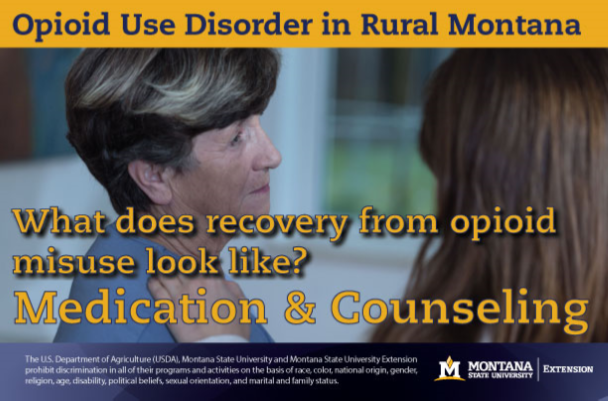
Taper Off From Your Opioid Prescription
You could experience pain and other unpleasant symptoms if you suddenly stop taking opioids. Talk to your doctor about gradually reducing your opioids in order to avoid withdrawal symptoms.
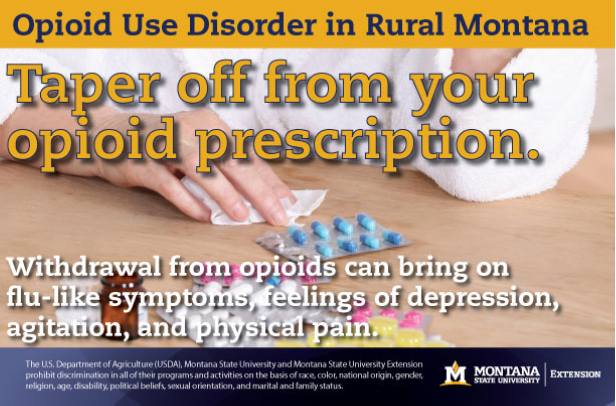
Avoid an Accidental Overdose
Many Montanans require long term opioid use for chronic pain management care. Talk to your doctor about how to avoid an accidental opioid overdose, including overdose reversal agents called Naloxone (also known as Narcan®)
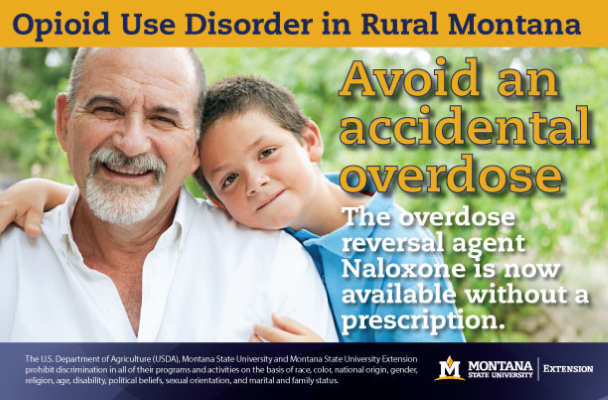
How Opioids Change Your Brain Chemistry
When taking opioids, over time the brain adapts by reducing its number of opioid receptors. Brain cells may even produce less of the "feel-good" neurotransmitter, dopamine. The changes that happen in the brain result in tolerance (needing to take more and more for the same effects) and withdrawal (very unpleasant symptoms when the drug is not available). This is why medication assisted treatment is recommended. MAT treatment can relieve stress on the brain so the brain can return to its original state.
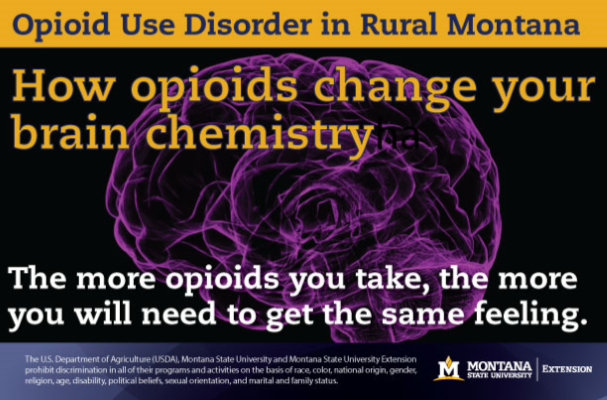
43% of Montana's opioid overdose deaths occur in people aged 45 & older.
To find out more about how to prevent opioid overdose, visit
https://powderriver.msuextension.org/OpioidPrevention.html
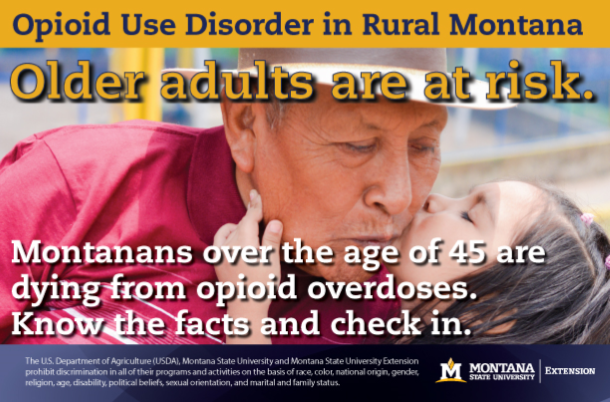
“This is the most important new resource for the millions of families struggling with drug and alcohol problems, and all the hopelessness and helplessness that goes with them.
- It provides reason for hope based on science;
- It provides a comprehensive, compassionate, and understandable plan; and,
- It reaffirms that applying the family’s kindness and positive reinforcement, rather than withholding it, is what makes change possible.” Tom Hedrick, Partnership at Drugfree.org
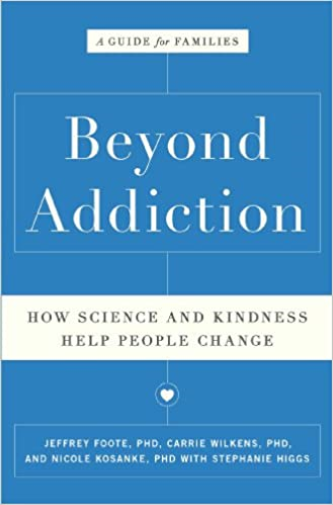
“…In discussing substance use disorders, words can be powerful when used to inform, clarify, encourage, support, enlighten, and unify. On the other hand, stigmatizing words often discourage, isolate, misinform, shame, and embarrass…”
Habit or Drug Habit: Calling addictive disorders a habit denies the medical nature of the condition and
implies that solving the problem is simply a matter of willpower. It is NOT that simple. Preferred terms: Substance misuse disorder, alcohol and drug disorder, alcohol and drug disease, active
addiction.
Substitution Therapy implies that treatment medications such as buprenorphine are
equal to street drugs like heroin. The term inaccurately suggests a lateral move
from illegal addiction to legal addiction. Addiction is an uncontrollable compulsive
behavior. The first goal is to stop the dangerous behavior. With successful buprenorphine
therapy, the dangerous addictive behavior is stopped not replaced. Preferred: Treatment, medication-assisted treatment, medication.
User is stigmatizing because it labels a person by his or her behavior. It is misleading
because “user” refers to one who is engaged in risky misuse of substances, but “use”
alone is not necessarily problematic. Preferred: Referring to use: Person who misuses alcohol or drugs. Referring to misuse: Person engaged in risky use of substances.
Lepak, Timothy P., The Worlds We Choose Matter. NAABT, Inc., naabt.org http://www.naabt.org/forum/topic.asp?TOPIC_ID=358
Replace “ABUSE, CLEAN, DIRTY” to Reduce Stigma
“Abuse” is stigmatizing because:
1) it negates the fact that addictive disorders are a medical condition;
2) it blames the illness solely on the individual with the illness, ignoring environmental and genetic factors, and the ability of substances to alter the brain;
3) it absolves those selling and promoting addictive substances of any wrongdoing.
INSTEAD use: Misuse, Harmful use, Inappropriate use, Hazardous use, Problem use, Risky use
“Clean, Dirty” is stigmatizing because illness symptoms (i.e. positive drug tests) are associated with filth.
INSTEAD use: Negative, positive, substance-free
Changing the stigma benefits everyone. It allows patients to more easily regain their self-esteem, allows lawmakers to appropriate funding, allows providers to treat without disapproval of their peers, allows insurers to cover treatment and helps the public understand that a substance use disorder is a medical condition as real as any other.
Lepak, Timothy P., The Worlds We Choose Matter. NAABT, Inc., naabt.org http://www.naabt.org/forum/topic.asp?TOPIC_ID=358
“Words are important. If you want to care for something, you call it a “flower”, if you want to kill something, you call it a “weed”.” Don Coyhis
Why does language matter? Stigma remains the biggest barrier to addiction treatment. The terminology used to
describe addiction contributes to the stigma. Many derogatory, stigmatizing terms
were championed throughout the “War on Drugs” campaign to dissuade people from misusing
substances. By choosing our language carefully, we can dismantle the negative stereotypes
associated with addiction and reduce this barrier to treatment.
Words to avoid: The terms Addict, Abuser, Junkie, label a person by his or her illness and deny him or her the dignity and humanity
to be seen and understood separate from his or her illness. These labels imply a
permanency to the condition or illness, leaving no room for a change in health.
REPLACE Addict, Abuser, Junkie with:
Person in active addiction
Person with a substance misuse disorder
Person experiencing an alcohol or drug problem
Patient (if referring to individual receiving treatment services).
Lepak, Timothy P., The Worlds We Choose Matter. NAABT, Inc., naabt.org http://www.naabt.org/forum/topic.asp?TOPIC_ID=358
More Positive Communication
Offer an understanding statement. Genuine understanding helps reduce defensiveness and promotes collaboration. Put yourself in your loved one’s shoes. You don’t have to agree with nor like what your loved one is doing, but you can understand some part of it. Try finishing this sentence and sincerely meaning it: “Yeah, I can see how you would….”. Strive to recognize a part of your loved one’s emotions, actions or reactions and use that in your message.
Accept partial responsibility. Sharing in a problem decreases the defensiveness and fosters collaboration. It shows that you’re interested in solving not blaming. It communicates “We’re in this together.” Some examples: “I know sometimes I overreact,” “I forgot to remind you,” “I’m not the best communicator myself.” Your loved one is probably used to feeling like a screw-up and being the focal point of blame. Your willingness to share the load, even in a small way, will help bring your loved one back to the conversations you would like to have.
Offer to help. Especially when phrased as a question, an offer to help can communicate non-judgmental, problem-solving support. Try asking, “Would it help if…?” Or, “How can I help?” Your loved one then knows you are willing to collaborate on a solution. And chances are, your loved one does need your help. Foote, J., Wilkens, C., Kosanke, N., & Higgs, S. (2014). Beyond Addiction: How science and kindness help people change.
Positive Communication Tips Continued
Be brief. Most people say more than necessary when they haven’t planned what to say, especially when nervous or angry. Try to hone your central request ahead of time and stick to it. Extraneous words can drown out your core message. Less gets you more.
Be specific. Vague requests are easy to ignore or misunderstand and often difficult to translate into concrete behavior. Instead of “It wouldn’t kill you to help out more,” specify how you would like the person to help: “It would really take the pressure off me if you emptied the dishwasher in the morning,” Referring to specific behaviors makes change observable, measurable and reinforceable.
Label your feelings. Kept brief, a description of your emotional reaction can help elicit empathy. State
your feelings in a calm, non-accusatory manner. For example, “It’s totally inconsiderate
of you to come home late and I’m losing my mind,” as opposed to, “I worry when you
come home later than you said you would.” Labeling positive feelings, when you mean
them, also lowers defenses and rewards positive behavior: “I am so thankful when you
help the kids with their science homework. I’m glad you’re here.”
Foote, J., Wilkens, C., Kosanke, N., & Higgs, S. (2014). Beyond Addiction: How science and kindness help people change.
Prepare for Positive Communication
People tend to be the LEAST prepared to communicate with the people who matter the
most.
It’s important to plan for what to say, even in our personal lives, particularly
when we want the communication to be productive and positive. Over the following
weeks, we will list some helpful communication strategies.
¨ Be Positive. “Positive” here refers to word choice, tone and framing. Words can be harsh, judgmental or critical; or they can be positive, inclusive, complimentary and hopeful. Consider how it feels to be on the receiving end of these words or statements:
“Confusing mood swings” instead of “Crazy”.
“Using OxyContin” instead of “Junkie”.
“Upsetting” instead of “Devastating”.
“Here’s how it looks to me” instead of “That’s total bull”.
“Let’s see where we can go from here” instead of “We’re back to square one”.
Words matter, particularly if you want someone to hear you.
The other meaning of “positive” is describing what you want, instead of what you
don’t want. This shifts the framing from critical and complaining to supportive and doable.
It’s easier to reward and recognize a person for doing something – a concrete verifiable
thing – than for NOT doing something.
Foote, J., Wilkens, C., Kosanke, N., & Higgs, S. (2014). Beyond Addiction: How science and kindness help people change.
Positive Communication
Positive communication is a critical skill for making change. It’s also an acquired skill. In families suffering from substance use: communication suffers. Positive communication takes effort and practice and may feel awkward at first, but here are five reasons to try:
- A communication system that breaks down into negativity and attack or silence only deepens wounds and rifts. Positive communication is the way out.
- Positive communication is “contagious.” When you communicate positively, others tend to mirror it. They listen better and understand more, and in turn feel better.
- Positive communication works. You will get more of what you want. It’s not manipulation; it’s improved communication.
- It works for the other person. The person you are communicating with will be less defensive and more collaborative.
- Positive communication helps everywhere. These skills apply to every interpersonal situation, from developing more satisfying friendships, to settling a customer complaint, to helping your loved one change.
In a gentle way, you can shake the world. – Mahatma Gandhi
Foote, J., Wilkens, C., Kosanke, N., & Higgs, S. (2014). Beyond Addiction: How science and kindness help people change. Scribner.
Mental Health Crises
If you or someone you care for is in a crisis or feeling suicidal;
- Call the National Suicide Prevention Lifeline at
1(800) 273-8255 - Text ‘MT’ to the Crisis Text Line at 741741.
These trained crisis counselors can help manage a crisis or can connect you with referrals or emergency services.
Also, you can call 911 and ask for a Crisis Intervention Trained (CIT) officer. CIT officers are knowledgeable about mental health crises and trained to handle mental health concerns with care.
Some Montana Mental Health Centers have crisis response and stabilization services that can provide emergency mental health services. Go to https://tinyurl.com/MTMentalHealthCenters for specific information.
“Be yourself, and don’t worry if someone doesn’t like you. Most people are struggling
to like themselves.”
-tinybuddha.com-
Understanding and Finding Mental Health Providers MontGuide
Hurt-Avila, K., Grocke, M., Burchak, A., Andersen, K., (2019)
Is Counseling Right for You?
|
|
Sometimes |
Often |
Never |
|
I feel sad. |
|
|
|
|
I feel lonely. |
|
|
|
|
I feel overwhelmed. |
|
|
|
|
I don’t feel joy in things that used to bring me joy. |
|
|
|
|
I feel angry. |
|
|
|
|
I feel restless. |
|
|
|
|
I am struggling with a |
|
|
|
If you answer “Sometimes” or “Often” to these questions, you might benefit from talking
to a mental health provider about services. Find a more complete survey at www.powderriver.msuextension.org
Taking care of your mental health takes courage.
Talk to someone today.
Understanding and Finding Mental Health Providers MontGuide
Hurt-Avila, K., Grocke, M., Burchak, A., Andersen, K., (2019)
What is Al-Anon?
Al-Anon is a support program for people whose lives have been affected by someone else’s drinking or drug misuse. By sharing common experiences and applying the Al-Anon principles, families and friends of people with substance use disorders (SUD) can bring positive changes to their lives, whether the person with a SUD admits there is a problem or seeks help.
Al-Anon is for family members and friends of people with alcoholism and dealing with the stress of everyday living. Individuals who attend meetings discuss the Al-Anon literature and learn how to treat themselves better. Family members learn how to cope in ways that create serenity in their lives which helps their loved ones whether their loved ones are sober or not.
There are times when family members and friends lose their focus in the world when they worry and try to help a loved one with the SUD. Friends and family members can become so involved in helping that they sometimes forget to take care of themselves. They become afraid of what others think and try to hide, excuse or cover up the unpleasantness and struggles of the disease.
In Al-Anon, families and friends learn that they “Didn't Cause, Can't Control, and Can't Cure” the problems of their loved ones.
Al-Anon meetings in Broadus are held on Tuesdays each week from 6:30 p.m. to 7:30 p.m. in the Courthouse Election Room. Meetings are open to anyone. ALL that is said at the meeting is confidential.
Telehealth
If you are in need of medical assistance or counseling while staying home to help reduce the spread of COVID-19, one suggestion is to try telehealth. Telehealth is the use of audio-video equipment to link patients and providers located at different sites. Ask your health providers about telehealth appointments, or Montana has both a Western Montana Telehealth Network (to learn about specific services, please call ((406) 751-3067) and an Eastern Montana Telemedicine Network ((406) 657-4870 or 800-332-7156). Using telehealth can ensure getting necessary care while also keeping you from accidentally getting infected with COVID-19. Utilizing telehealth also helps lower the risk of infection for medical professionals, allowing them to stay healthy to care for others.
Source: Grocke, M., Routh, B. The COVID-19 Health Pandemic: What is it and What can I do to Stay Healthy? Lives and Landscapes, 2020Spring
Finding a mental health care provider;
1) Contact or call your health insurance company or Medicaid to request a list of approved private practice providers.
2) Contact a community health agency such as the Eastern Montana Mental Health Center in Miles City at 406-234-1687 or access information at https://tinyurl.com/MTMentalHealthCenters.
3) Contact federally qualified health centers. https://findahealthcenter.hrsa.gov.
Please note that all websites listed are also on the MSU Extension Service – Powder
River County website at www.powderriver.msuextension.org
If you have difficulty accessing a mental health provider, consider seeking help from
a clergy member or a respected leader in the community or someone listed in the Wellness
Weekly ad. Training and qualifications will vary, but the important thing is to reach
out to someone.
Understanding and Finding Mental Health Providers MontGuide
Hurt-Avila, K., Grocke, M., Burchak, A., Andersen, K., (2019)
Anxiety. Depression. Mood disorders and Substance Misuse are health conditions that
are more common than you think.
Who are the health provider options?
The providers listed below have master’s or doctoral degrees, supervised clinical experience, and state licensure.
Counselors are Licensed Clinical Professional Counselors (LCPCs) or Licensed Marriage and Family Therapists (LMFTs) or Licensed Addiction Counselors (LACs) who serve clients individually and in groups.
Social Workers are Licensed Clinical Social Workers (LCSW) who help people cope with and solve problems in their everyday lives. Social workers emphasize the importance of social systems of support to enhance social functioning
Psychologists provide mental health services and can administer assessments to diagnose cognitive, developmental, behavioral, and mental disorders.
Counselors, Social Workers, and psychologists can diagnose and treat mental, behavioral and emotional concerns, provide talk therapy and may have specialized training in other types of therapy.
Psychiatrists are medical providers (M.D. or D.O.) who specialize in the medical treatment of psychological disorders. They can prescribe medications, perform a full range of medical tests to provide a picture of the patient’s physical and mental state and manage a patient’s medication as part of their treatment. Psychiatrists typically do not engage in talk therapy.
Understanding and Finding Mental Health Providers MontGuide
Hurt-Avila, K., Grocke, M., Burchak, A., Andersen, K., (2019)
Are you feeling anxious or depressed?
Try Thrive, an online program designed to reduce symptoms of anxiety and depression. Thrive is a self-paced, interactive Cognitive Behavior Therapy program that is FREE to adult Montanans. It has been adapted for use in Montana as part of a project led by Dr. Mark Schure, through the MSU Center for Mental Health Research and Recovery. This self-directed program is available at www.thriveforMontana.com


Prescription Opioid Misuse Prevention
Remember that SAFELY USING, STORING and DISPOSING of prescription opioids REDUCES misuse. The best place to dispose of any and all unused prescription drugs is the prescription drug drop-box located at the Powder River County Sheriff’s office entryway.
Another disposal option is to mix unused medications with coffee grounds or kitty
litter in a sealed plastic bag and  dispose in the household trash. Drug deactivation pouches, or Deterra bags, are single-use products available at the courthouse, the Public
Health office or the Senior Center. The pouches contain a substance that neutralizes
the medications allowing you to then dispose the deactivated medications into the
household trash.
dispose in the household trash. Drug deactivation pouches, or Deterra bags, are single-use products available at the courthouse, the Public
Health office or the Senior Center. The pouches contain a substance that neutralizes
the medications allowing you to then dispose the deactivated medications into the
household trash.
Flushing opioids is only recommended when no other disposal options are available. Remember that the type of plumbing (i.e. septic systems) plays a role in flushability of medicines. The FDA has a flush list available to see if a medication can be flushed: https://www.fda.gov/drugs/disposal-unused-medicines-what-you-should-know/drug-disposal-flush-potentially-dangerous-medicine#FlushList.
Take some time, today, to go through old medications and dispose of them properly.
Grocke, M., Allen, B., Stevens, W., Vardanega, K., Brennan, A., Paul, K., (2019).
Prescription Opioid Use and Misuse in Montana MontGuide
Preventing Prescription Opioid Misuse
We each can REDUCE the RISK of misuse or overdose by safely using, storing and disposing of prescription opioids.
Safe Use: Like any medication, take opioids ONLY as prescribed, NEVER take more than instructed, and NEVER take somebody else’s medicine. NEVER give or sell medication to someone else. Do NOT combine prescription opioids with alcohol or other drugs.
Safe Storage:
HIDE and LOCK away opioids where family, friends, or guests cannot find them. Keep
medications in their original packaging, so it is clear who the medications are for
and how they are to be used.
Safe Disposal:
Dispose of the medication as soon as you no longer need it. Do NOT keep opioids “just
in case.” Take the unused medications to the prescription drug drop-box located in Broadus at the Powder River County Courthouse near the Sheriff’s office
entryway.
Grocke, M., Allen, B., Stevens, W., Vardanega, K., Brennan, A., Paul, K., (2019). Prescription Opioid Use and Misuse in Montana MontGuide
SIGNS of an OPIOID OVERDOSE
Call 911 immediately, if someone is experiencing ANY of the following:
- The person’s face is extremely pale and/or feels clammy;
- Their body goes limp;
- Their fingernails or lips have a purple or blue color;
- They start vomiting or making gurgling noises;
- They cannot be awakened or are unable to speak;
- Their breathing or heartbeat slows or stops.
Taking benzodiazepines or central nervous system depressants such as anxiety-relieving medicines, seizure medicines or sleep aids and/or alcohol with opioids GREATLY INCREASES the risk for overdose or death.
Grocke, M., Allen, B., Stevens, W., Vardanega, K., Brennan, A., Paul, K., (2019). Prescription Opioid Use and Misuse in Montana MontGuide
Signs of Opioid Misuse
The following behaviors may be a sign that someone is misusing opioids:
- Regularly taking an opioid in a way not intended by the provider including taking more than prescribed or taking the drug for the way it makes the person feel;
- Taking opioids “just in case” or when not in pain;
- Experiencing changes in sleeping patterns;
- Borrowing medication from others;
- “Losing” medications so that new prescriptions must be written;
- Seeking the same prescription from multiple providers;
- Making poor decisions, which includes putting themselves or others in danger
Misuse, also known as a Substance Use Disorder (SUD), or an “addiction”, is treatable. An SUD is a chronic medical condition involving
genetics, the environment, life experiences, and complex interactions in the brain.
Behaviors may become compulsive and continue despite harmful consequences.
Grocke, M., Allen, B., Stevens, W., Vardanega, K., Brennan, A., Paul, K., (2019).
Prescription Opioid Use and Misuse in Montana MontGuide
What is an Opioid?
An opioid is medication prescribed for pain relief often after surgery or an injury.
Recently, opioids have been prescribed for chronic pain, despite risks and lack of
evidence supporting this practice.
Opioids include:
*Natural opioids: morphine and codeine
*Semi-Synthetic opioids: Oxycodone, Hydrocodone, Hydormorphone and Oxymorphone
*Synthetic Opioids: Fentanyl, Tramadol, Methadone, an opioid used to treat pain,
but can also be provided through
opioid treatment programs to treat opioid use disorder.
Opioid Use and Misuse
Proper use is taking prescription opioids in the amount and duration specified by a medical
provider.
Misuse occurs when opioids are taken in a manner or dose other than prescribed. Examples are:
*taking too much medicine,
*taking someone else’s medicine,
*taking it in a different way than as intended,
*taking the medicine to feel euphoria.
Opioid misuse affects people of all ages, genders, ethnicities and income levels.
Grocke, M., Allen, B., Stevens, W., Vardanega, K., Brennan, A., Paul, K., (2019).
Prescription Opioid Use and Misuse in Montana MontGuide
Positive Strategies for Handling Stress
- Have open communication – Stress affects everyone in the family, so TALKING and LISTENING to one another can help the family through tough times.
- Be flexible – Family members have different roles and expectations. During stressful times, those roles may need to change. For example, if a full-time homemaker starts working outside the home, the rest of the family may need to pitch in to HELP with household tasks.
- Stick together – Families who feel they are CONNECTED to & rely on each other do better in difficult times. Keep family activities a priority.
- Seek help & support from others – Reach out in time of need. You’ll be able to handle the stress better and possibly avoid a crisis. Neighbors, family members & other resources are available.
- Maintain faith/spirituality – Having a sense of spirituality gives us the inner strength needed to handle tough times.
- Develop family member autonomy – Family members need to be connected, however each needs to feel a sense of independence.
Help each member realize that he/she has some CONTROL and the ability to be part of
the solution of helping the family through tough times.
Bailey, Sandra, Ph.D., CFLE (2017). Family Stress and Coping Montguide
Managing Stress
First take care of yourself. To help others, you need to be healthy and able to handle situations in a positive manner. Here are some ideas:
Be Realistic – When feeling overwhelmed, don’t try to do too much. Ask for help. Can someone else pick up your child after school?
Focus on one thing at a time – Make a list and prioritize it. Use the list to help delegate tasks to others.
Exercise – Physical exercise reduces stress. Walk the dog or go on a hike.
Laugh – Find time to have fun and laugh with friends and family. Take a break from taking things too seriously.
Maintain a healthy lifestyle – Eat well, cut down on caffeine and high sugar foods, avoid alcohol and drugs. Get enough sleep.
Help others – Do something nice for someone else. Visit an elderly neighbor. Doing something for another person helps improve our mood.
Talk to others – Talking about a concern often helps it seem like less of a problem.
Bailey, Sandra, Ph.D., CFLE (2017). Family Stress and Coping Montguide
Stress affects the entire family...
Picture the family as a mobile that hangs over an infant’s crib. It we touch one part of the mobile, the rest moves. The same thing occurs with stress.
If one family member experiences stress, the others will be affected as well. We
may think we are hiding our stress; however, our family can sense it. Spouses may
become short with one another or argue more due to stress. It’s important to be aware
of how stress affects each family member individually and the family as a whole.
Bailey, Sandra, Ph.D., CFLE (2017). Family Stress and Coping Montguide
“The chaos of everyday life often seems to intensify in January and February. One
key that can help you avoid feeling overwhelmed as you fight the mid-winter blues:
Find ways to regain control, no matter how small.”
Visiting Nurse Service of New York
“The only person who can pull me down is myself, and I’m not going to let myself pull
me down anymore.”
C. JoyBell C.
Your BODY Tells You About STRESS
Think about what might be going on in your life. Everyone experiences signs of stress, which may include:
· Feeling tired all the time
· Losing your temper
· Being forgetful
· Laughing or crying for no reason
· Frequent physical illness
· Changes in sleeping or eating
· Headaches
· Increased alcohol, tobacco, or other drug use
If these signs persist for more than two weeks or the stress is negatively impacting
your life, talk to a friend or seek help to learn new ways of coping.
Bailey, Sandra, Ph.D., CFLE (2017). Family Stress and Coping Montguide
“The greatest weapon against stress is ones ability to choose one thought over another.” Williams James

